
Marshall Nych
Marshall Nych’s habitat is a family farm in New Wilmington, PA. When Marshall isn’t writing outdoor humor, he is an elementary teacher misguiding the youth of Mercer County. Although Nych has fished 15 states and 4 countries, his best catches remain his wife and daughter.
I Love a Parade
By Marshall Nych
 October was just a week old. The crisp, cool autumn air filled my lungs with hope, life, and purpose. This archery season promised to be a good one. Unbeknownst to me, it had its fingers crossed!
October was just a week old. The crisp, cool autumn air filled my lungs with hope, life, and purpose. This archery season promised to be a good one. Unbeknownst to me, it had its fingers crossed!
On Friday night, I had planned an evening hunt with my bow, favorite stand, and the many deer on our family farm. However, my devious little sisters, Gigi and Krissy, had other plans. They insisted that either my father or I take them to the West Middlesex Homecoming Parade.
“All of the popular kids will be there,” cried Gigi.
“Yeah. We have to go,” snapped Krissy.
Ironically, my own sisters were becoming less popular with me by the second. I do not believe they cared.
Looking towards my father and I with her patented puppy dog eyes, Gigi said, “One of you has got to take us!”
I looked to my father, the head of the household, who always used good judgment to make the right decision. My dad immediately grabbed his hunting gear and headed for the door.
“Have fun with the girls Marshall,” Dad snickered.
Speaking of Snickers, the only comfort I managed to find was that I might get some sugary loot from this parade. I grabbed three large feedbags from my grandpa’s barn and the three of us were off to beautiful downtown West Middlesex.
Gigi, Krissy, and I arrived along Main Street at about the time I should have been arriving to Gitmo (our farm’s deadliest stand.) I am still trying to figure out why West Middlesexuals (that is what someone from West Middlesex is called) decided to call it Main Street. The road hosts dilapidated, cracked sidewalks that connect the school to Dairy Mart and Dairy Mart to our only local bar, the Bear.
As the parade began, I had deer on my mind. I constantly glassed small yards and glared onto porches in search of the elusive whitetail. Various organizations floated by our sidewalk stand. I quickly made an observation. Most of the people in the parade were old! Old men made up the entire local VFW float as well as the neat little Zem Zem cars. I wouldn’t have considered this observation such a bad thing if old men actually knew how to throw candy.
Our feedbags were still empty when the Homecoming Court convoy drove along Main Street. Most towns have future queens perched upon Corvettes and other fine sports cars. I have shared with you just how different West Middlesex is. Our teenage royalty rode shotgun in rusty trucks or on top of dusty tractors. One young lady was in something close to a Corvette…she was nestled in a Coronet. I was a little disappointed (mainly that none of the sweethearts threw any Sweet Tarts!)
Gigi, Krissy, and I knew the goodies were about to show up! The West Middlesex Volunteer Fire Department always drove their fire engine through the parade and has amassed an indisputable reputation for giving the most grub.
There hadn’t been too many fires to fight, so the firefighters, having nothing better to do, pulled out all of the stops for this year’s Homecoming Parade. The entire volunteer crew volunteered to dress like circus clowns as they made their parade appearance. The uniformed firefighters hid behind white makeup, red noses, and fuzzy wigs. This made me question both the quality and sanity of our “homeland security.”
Just before the big red fire truck had made its way to our spot in front of the convenience store in a one-convenience store town, the sirens went off with an eerie authenticity. Suddenly, the clowns did not seem so friendly. Worse yet, the volunteer crew quit throwing their handfuls of Smarties and Snickers.
Apparently outside of town Old Man Burns’ barn had caught on fire while he was smoking one of his cheap cigars. The fire truck was summoned immediately. This tidbit was not revealed to the rest of West Middlesex…especially the small children who wanted candy! The crew jumped in the truck and hit the gas. The screaming truck (the screaming was from the clowns, not the truck) swerved between the marching band and the Zem Zems trying to escape the very parade that gave them their annual supply of fifteen minutes of fame.
Little kiddos were racing onto the road thinking that the fire truck would reward them as it had in parades past. However, it nearly turned them into small pavement pancakes instead. Clowns were cursing and throwing candy way up in the trees to lure the children and me off the roads. This ploy worked for most of the kiddos…not me.
The West Middlesex Volunteer Fire Department finally succeeded in its exit and arrived to the flaming barn. According to the newspaper, they did a fine job extinguishing the blaze. I would have given up another night of hunting and my empty sack of candy to see the look on Old Man Burns’ face when a truck full of clowns pulled up to his barn!
Marshall Nych’s habitat is a family farm in New Wilmington, PA. When Marshall isn’t writing outdoor humor, he is an elementary teacher misguiding the youth of Mercer County. Although Nych has fished 15 states and 4 countries, his best catches remain his wife and daughter.
Tinkering
By Marshall Nych
“To keep every cog and wheel is the first precaution of intelligent tinkering,” wrote Aldo Leopold, the Father of Conservation.
I am uncertain as to how smart my starts with reloading have been. Still, I have eagerly begun tinkering with this explosive hobby. Before I even unscrewed the cap from the gunpowder or secured reloading tools to my bench, family members left hints and innuendos of their preferred load. The variety was astonishing. I could toil away the duration of a life’s work and die before amassing so many dies.
I discerned much can be learned about a person by the gun they carry. Say the chap has a fine, one-of-a-kind Italian over and under. Though the man is classy, well educated, handsome and successful, he isn’t the kind of guy you’d want to have a beer with. For starters, the gentleman doesn’t drink beer. Probably Scotch. A strong foundation requires common ground. Good looks and smarts, I see no parallels.
Then there’s the guy with a beat down, scratched up, dented in12 gauge. This is the kind of man fearlessly getting his hands dirty. In fact, the shotgun he carries gets the brunt of grime before making it to his hands.
This tribute celebrates not only the sport of shooting and follow-up art of reloading, it also commemorates the caliber of characters and rifles hunting various limbs of my family tree. I welcome the reader and reloader alike to draw their own conclusions and sight in their personal firearm identity.
 A good place to start is at the top. Perched on the pinnacle is the patriarch. Grandpa prefers his .30-40 Krag. The rifle dutifully served in the military during the World War. From there, it was sentimentally handed down from Papa’s older brother Jule, a soldier in the Army. Grandpa aimed small and missed seldom. The only drawback of the .30-40 Krag would be reloading. If it took as long for the United States to win the war as it did for me to track down dies, our country would be in trouble.
A good place to start is at the top. Perched on the pinnacle is the patriarch. Grandpa prefers his .30-40 Krag. The rifle dutifully served in the military during the World War. From there, it was sentimentally handed down from Papa’s older brother Jule, a soldier in the Army. Grandpa aimed small and missed seldom. The only drawback of the .30-40 Krag would be reloading. If it took as long for the United States to win the war as it did for me to track down dies, our country would be in trouble.
My father is most himself when toting a .50 caliber flintlock. Personally, I believe this has something to do with his knack for procrastination. Every fall finds Dad’s bow a varying degree of unprepared. Father had never got around to sighting it in, didn’t have enough arrows, or pulled another excuse from his quiver. Eternally distracted by the calls of nature, Dad never seems to dial in his rifle for firearms season. Hence, an annual tradition has become my father forced afield by late season flintlock. Do not be fooled by his early season apathy, the man punches tags faster than a railroad ticket taker. Last winter, Dad filled three deer tags in as many days. Two of the deer were harvested in back-to-back drives.
Cousin Grizz carries a .30-06 with cheap optics. Ironically, between his ears, he too dons cheap glass. Duct tape has been trusted to hold eyewear together and/or to his face. Most hunts are riddled with losing or cracking one form of optics. Arguably, with a nickname stemming from a bruin, my cousin wants to be prepared for any beast encountered in the wilds of Pennsylvania. A .30-06 provides desired comfort. Plus, ammo and reloading resources are readily available.
Jim, my father-in-law, watched one too many spaghetti westerns as a kid. Consequently, the first side effect is Jim requesting pasta with every meal. The second drawback would be the fact he only shoots cowboy style .45 calibers. My dear father-in-law promised the next gift he gets me will be everything I need to properly stock his shelves.
Cousin Lou’s favorite rifle happens to be a .270. Lou has taken his fair share of deer with this flat shooting caliber. My cousin says he depends on a caliber quick enough to dispatch a raging bull. He is a dairy farmer. I only know his preferred diameter because it’s what I shoot. Though I have tried, Lou never bums me a bullet. Imagine my fellow shooter’s surprise when I go from freeloader to reloader.
Younger brother Ryan opts for a 30/30 lever action. Less of a personal choice, little brother went with the bullet bestowed by Dad. Still, years of missing has honed Ryan’s skills with the lever considerably. Coupling his poor shooting with his quick action, I predict the 30/30 will be my most prolific reload.
As I mentioned earlier, my favorite caliber is a .270. Older brother Nate, who is fueled by a burning sibling rivalry, always needed to top his little brother. Perhaps this is why he fires a .280. Big brother has a one-hundredth of inch bigger gun. If my .270 reloads do not fit his Remington, it’s not a little-gun-toting little brother’s fault.
Give me one each of the following and I will hunt happily: shotgun, big game rifle, twenty-two, muzzleloader, and handgun. I am far from a shooting expert. Unless the readership is one, it is impossible to understand or reason with the pros.
If there are 5 men in a room, logistically and mathematically, there could be 10 different handshakes. However, place 5 gun experts in the same space and the combinations are infinite.
Expert Quote 1: “On a cloudy day, I like to carry my .243, open sight of course.”
Expert Quote 2: “Tomorrow is the autumnal equinox, better go out and treat myself to a new insert make, model, and caliber.”
Expert Quote 3: “Slacker! I already have that one in wood and synthetic stocks each with stainless and blued barrels!”
The saying goes, give a man an inch and he will take a foot. I have found give an authority on guns a yard and he will show up with a bazooka. The evolution of a rifleman starts at a young age with a slingshot or Daisy. From there, one evolves decades across fine shotguns and vintage classics. At some point, one starts tinkering with reloading.
Marshall Nych’s habitat is a family farm in New Wilmington, PA. When Marshall isn’t writing outdoor humor, he is an elementary teacher misguiding the youth of Mercer County. Although Nych has fished 15 states and 4 countries, his best catches remain his wife and daughter.
Still Beating A Dead Horse
by Marshall Nych
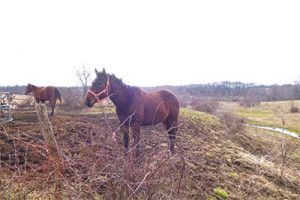 There is nothing I hate more than sequels to hit movies or popular television programs ending with “to be continued…” I also despise when a fine literary trilogy is somehow morphed into seven Hollywood movies. Hypocritically, I did feel the need to provide an update on a prior story. If you are amply unprivileged and unfortunate, you may have read “Beating a Dead Horse” from my 2nd mistake of a book Field Tested: Back to Abnormal.
There is nothing I hate more than sequels to hit movies or popular television programs ending with “to be continued…” I also despise when a fine literary trilogy is somehow morphed into seven Hollywood movies. Hypocritically, I did feel the need to provide an update on a prior story. If you are amply unprivileged and unfortunate, you may have read “Beating a Dead Horse” from my 2nd mistake of a book Field Tested: Back to Abnormal.
For those who have enjoyed peace, happiness, and sanity up to this point, here’s a quick recap: An eccentric lady, Gertrude, moved herself and thirty some horses from New England to our western Pennsylvania farm. Gertrude enjoyed the humanitarian prestige and high public opinion more than actually caring for her horses or shoveling their exhaust. Gertrude elegantly named all of the horses after her favorite pastime – hard liquor.
One character forgotten in the pages of the first story was her enslaved boy. He was likely in hiding when I twisted the original tale. Whether he was a son, other relative, hired hand, or kidnap victim never was clear. As I sit here now, I can still hear Gertrude holler his name across our fields. What was it? I know it started with a B. Oh yes…
“Get ta’ work B-A-R-N-Y!”
Barny, I am left to assume, was short for Barnacle.
So the crazy horse lady and her equally crazy horse boy continued their equestrian quests following the controversial, publicized demise of their prize horse Kaluha. Though four digits richer after cashing the check from the Humane Society, the pair quickly became unstable once more, unable to tame the wild debt owed to my grandparents. Monthly rent came yearly. Money for oats and hay, which should have arrived in a bale, came in grain-sized increments. The amount of time, energy and sheer creativity, the duo put into their excuses was admirable. If Gertrude and Barnacle would have harnessed this evasiveness into work, they could have really done well in life.
Perhaps that was part of the problem. Gertrude enslaved Barnacle to do all of her dirty work with the horses. Dirty work with horses ends up being all work with horses. The problem was Barnacle hated all forms of work. The boy put constant effort into avoiding his greatest fear – a job. The only finger I ever saw him lift was his social one. He showed it to me a couple of times. No one ever accused Barnacle of being a nice kid. At the boy’s idle leisure, the horses suffered.
Around the peak of Barnacle’s equestrian apathy, my father-in-law Jim and I were working around the farm. As luck had it, we were able to use my truck to complete the tasks that particular day. With all of the work, I had forgotten about the deepest rut on the back forty. As I hit the chasm going full speed, Jim and I were taken aback when a “YELP!” erupted from the bowels of my truck. Upon investigation, we found the horse-boy-stowaway in the bed. Unbeknownst to us, we had been Barnacle’s taxi all day, making his chores far less laborious. Had I known Barnacle had attached to my Chevy, I would have embraced and sought out every one of my farm’s delightful features.
It was quite common, after a day in and around the farm, to drop the tailgate and find Barnacle had covertly placed feed, fence, tools, and other symptoms associated with Gertrude’s horse disease. I found little comfort in knowing I helped haul Barnacle’s junk.
I tried to lie to myself that by helping the lethargic troll, he could do a better job caring for the horses. At the fingertips of his handiwork, the herd escaped as frequently and reliably as Houdini. The horses looked at the fence Barnacle haphazardly erected to be as threatening as marshmallows. Gertrude’s entire top shelf brands of liquor poured into my garden and spilled through my landscaping as they pleased.
One June, various uncles, aunts, and cousins were stacking hay bales in the barn. Below the barn is where Gertrude stabled some of her victims. Grandpa had noticed stacks of hay getting shorter. While we tossed bales to one another, the imp climbed through a small opening. Barnacle was just as surprised to see us as we were to see him. Mystery solved…to avoid walking across the property and carrying hay to the horses, Barnacle simply pushed the stolen hay from Grandpa’s barn. The horse boy was so lazy he made gravity feed the herd.
Upon us catching him in the act, Barnacle clung onto desperation and offered to do a couple hours of work. Knowing full well his couple hours would be worth a couple of minutes, we let him go. Our family simply added it to his tab.
Approaching a $4,000 debt, my grandparents applied some pressure to these festering wounds. More importantly, Grandma did not want associated with a herd of horses that had the health and disposition as one residing in the town where Purina and Elmer’s factories were found. Secretly, Gertrude cooked up and stuck to a plan involving a West Virginia escape. The last invasive species the wild and wonderful state needs invading were Gertrude and Barnacle. West Virginia would be forced to add wacky to the state motto.
Oft we have heard the saying pertaining to riding a horse off into the sunset. Gertrude and her imbecile boy waited a few hours after sunset. In the middle of the night, it required two fools to take one foal each mission. Their goal was to sneak off the farm, one horse at a time.
The Nych family was well aware the horses were slowly dwindling. We were reveling in the fact. Some of the cousins were even thinking about showing up one midnight to help speed up the secret operation. Tough Guy even considered giving Gertrude the four grand to just disappear.
Still investigating the mysterious death of Gertrude’s Kaluha, federal agents observed these late night escapades. Before long, two officers appeared on Grandma’s front porch. The closest the agents’ spotless, clean-cut look fit in was about an hour’s drive south.
Grandma, who smelled a problem through aromas of chicken soup on the stove, asked, “What kind of trouble did my boy get into now?”
The agents, putting away their perfectly polished badges, were caught off guard. The female officer said, “M ‘am, we are not here in regards to your son.”
“This time,” added the male officer.
The lady agent continued, “We are looking into Gertrude and her horse operation. Such mistreatment of horses is highly illegal…”
“And highly expensive,” interjected the man, likely sensing this was the kind of case you could retire on.
“The landowner can also be held liable in such investigations. It is in your best interest to sever any ties you have with Gertrude and her property immediately,” finished the agent.
“And that odd horse boy too,” added the male.
Grandma, with her uncommonly strong common sense, snapped, “It’s easier to get yourself in trouble abusing a horse than a child nowadays!”
Both agents, unable to argue, nodded then dismissed in unison, “Have a good day M ‘am.”
This little visit from the Feds was all the motivation Grandma needed to evict the future convicts. Gertrude, a few dozen mange-infested horses, and Barnacle fled to the wilds of West Virginia before the agents were able to catch them in Pennsylvania.
Justice prevailed. The local paper (perhaps another slow day in the news) reported Gertrude had been arrested and imprisoned for the cruel and unusual treatment of equine species. Her bail was set at $90,000 (a bit more than she owed us for our bales), thus confirming Grandma’s theory about animal and child abuse. Looking closely at her son Barnacle, one can see why law books were written in such a way.
Anytime someone found themselves behind bars in one of the old western flicks, there was usually a steadfast horse parked below the jail cell window. A posse then prompted the prison break with rope, which could somehow jeopardize the entire soundness and structure of any correctional facility. At this point, the prisoner would hop onto the horse and gallop towards freedom and a remarkable sunset.
Had Gertrude taken better care of her horses, perhaps there would be one willing to saddle up to the plot of her escape. Plus, the way she worked poor Barnacle, it’s no wonder he didn’t round up a posse and ample rope.
After Gertrude gets out of jail in 4 – 6 years, likely about 20 in horse years, the crazy horse lady will pursue greener pastures. Such fields, far from our family, will be without stallions, mares, or roans. However, there will always be one fool…a nag still beating a dead horse.
Marshall Nych’s habitat is a family farm in New Wilmington, PA. When Marshall isn’t writing outdoor humor, he is an elementary teacher misguiding the youth of Mercer County. Although Nych has fished 15 states and 4 countries, his best catches remain his wife and daughter.
Done Right
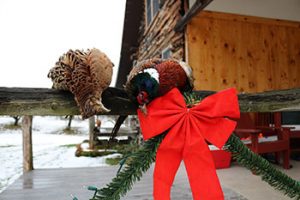 The classic adage reminds us, “If you want something done right, you have to do it yourself.”
The classic adage reminds us, “If you want something done right, you have to do it yourself.”
Nowhere does this bell ring truer than the outdoors. With no one is this chime heard with greater clarity than my father-in-law Jim Harper. Harper’s passion projects cover all of the elemental bases – reloaded shotgun shells are born for the air, homemade longbows are grounded on earth, and handcrafted kayak are destined for water.
Be it tinkering in his reloading den or toiling in his vegetable garden, the man’s meticulous attention to detail and dogged work ethic lead to a job done right. This knack for doing things the right way the first time has trickled into his outdoor passions and pursuits. His noteworthy successes with reloading, archery, and boating are welcomed side effects of skilled labor and countless hours mastering his perspective craft.
Half of Jim’s basement is dedicated to reloading. You name it, Harper can reload it. Family and friends alike depend on Jim to feed shotguns, rifles, and handguns. Overlooking tables of dies and tumblers are shelves of brass, lead, and gunpowder. Like a symphony, the ingredients work a concerted harmony in the name of shooting sport. Harper’s generous spirit, there is not a caliber he won’t shy away from to help a friend.
Some celebrate the holidays and share talents with a plate of homemade cookies. Jim starts from scratch with a different medium. He cooks a perfect batch of six shot. Dozens fill the vests of his hunting buddies. This thoughtful Christmas present oft leads to a Christmas pheasant.
With respect to reloading, there have yet to be dies matching the caliber of Harper’s character.
The other half of Jim’s cellar is devoted to traditional archery. Adorning the walls better than any wallpaper ever could are frames of arrowheads, pottery, and other Native American artifacts. When efforts of a farmer’s plow were washed by spring rains, Jim and his father would be there to work the fields. Like the Native Americans before them, their preferred hunting grounds were along Wolf Creek. Jim’s greatest find was an authentic axe head, his father’s a ceremonious eagle shaped piece.
When Jim wasn’t discovering archery artifacts, he was creating his own archery equipment. My father-in-law diligently watched for stands of Osage orange. Their bright staves were step one in the lengthy process leading to Jim’s finest bows. Dried wood was painstakingly shaped with the same growth ring on the bow’s long surface. Perhaps the bows Harper finished shared a birthday with the shooter. Regardless, Jim’s sweat fell atop the whitetail deer sinew, which wrapped tightly along the bow to strengthen it. The man even fashioned his own arrows, straight as anything found in modern bow shops.
While basement has been consumed by hunting, Harper’s garage pays homage to the aquatic world angling and boating. Amongst antique tackle and wooden plugs handed down from his father, Jim has honed his skills in boat making.
 With craftsmanship second to none and strips of fine cedar, Jim assembled the most handsome kayak most have ever laid eyes on. From Lake Erie to local ponds, the perfect palindrome senses the pulse to any body of water. In fact, most times Jim slips into his kayak, many fellow sportsmen ask where he got it or, in a few cases, make Harper an offer on the spot.
With craftsmanship second to none and strips of fine cedar, Jim assembled the most handsome kayak most have ever laid eyes on. From Lake Erie to local ponds, the perfect palindrome senses the pulse to any body of water. In fact, most times Jim slips into his kayak, many fellow sportsmen ask where he got it or, in a few cases, make Harper an offer on the spot.
Such sentimental things cannot be fetched with a price. Our family tree must be a cedar, for the 15 foot vessel will glide as one with the water’s surface for generations to come. Only when Jim works the paddle, thrusting into the cool waters, is it noticeable the kayak and its passenger are only visiting guest.
A job done right tends to positively influence others. I for one have been graced with Harper’s touch. When upland bird hunting with Jim’s reloads, I hunt a little harder and forget the pain associated with Pennsylvania’s peaks. A grouse hunt holds more meaning if reloads are tucked in the barrel, side by side like Jim and I on the trail.
In stand with one of Harper’s fine longbows in hand, I exhibit the most extreme caution to promote ethical shots. I want justice for not only Harper’s handy work, but also the fine animals we have come to love.
Nestled in Jim’s kayak, I truly delight in my surroundings. Each time I find myself seated within such beauty, I cannot help but feel it helps me observe and appreciate nature’s beauty to a greater degree. Climbed into the boughs of the cedar, each and every cast is treated like a perfect or final one.
I have now had the honor of having Jim Harper in my life for more than a decade. Harper is a wonderful father to my wife and delightful grandfather to my children. In my experience, I have come to find if you want something done right, ask Jim.
Gertrude’s starving horses look happy.
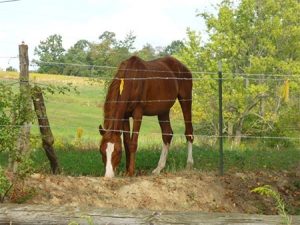 I am confident to declare the most incorrect stereotype about hunters and fishermen is the assumption they are inhumane and care not for the welfare animals. In all seriousness, I must stress this is simply not true. On the contrary, sportsmen love animals so much, they spend ridiculous amounts of time, effort, and money trying to eat them.
I am confident to declare the most incorrect stereotype about hunters and fishermen is the assumption they are inhumane and care not for the welfare animals. In all seriousness, I must stress this is simply not true. On the contrary, sportsmen love animals so much, they spend ridiculous amounts of time, effort, and money trying to eat them.
I grew up in an area of Pennsylvania where work was a last resort. In fact, one afternoon while eavesdropping on a conversation about me, I heard my mother ask my father, “Is he crazy?”
“Marshall? Course not…he’s much too lazy to be crazy!” replied Dad.
Father was right. Crazy entails senseless action, much building, and much doing. In my relaxed neck of the Pennsylvania, we celebrate our laziness and will go to great lengths to secure it. For example, Pennsylvania is home to many deer. PA also has many drivers. It is nothing to see a deer alongside the road. In the battle between vehicles versus deer, the vehicle wins just about every time.
Traveling my routine route, one just pleasantly paved, I recently swerved around one particular case where somebody didn’t do their job and pick up the cervidae. No big deal. Laziness, in its purest form, is the degree to which people will do work to get around work. Upon my return, I observed a road crew painting the lines, taking measurements, and standing around in large chatty groups. As I approached where the deer and family sedan had battled, I couldn’t believe my eyes. There, right where I had seen it in the morning, lay a deer with two fresh yellow lines. I knew not to pass.
Let us lazily drift back to the family farm. My grandfather, one of the only hard-working men I have ever known, has diversified the farm. Unable to keep up with the high demands of a dairy farm, Grandpa began raising livestock and grain farming. In recent years, Grandpa began renting out small portions of land. One such renter was a lady who “rescued” old horses. Gertrude, a short, fat woman with more money than brains, was a bit of a hag herself. Gertrude started by stacking five or ten horses into the barn like sardines with manes. It wasn’t until she achieved piles of twenty that she began referring to herself as a selfless humanitarian.
Being a yuppie from the New England area, Gertrude cleverly named her horses after her favorite drinks. Guess what? Coffee, iced tea, or fruit punch did not make the list.
At the peak of Gertrude’s heroism, my family noticed one of the older horses, Kahlua, was constantly losing his balance. The entire neighborhood sadly watched Kahlua with a watchful eye…twitching, but watchful nonetheless. A concerned friend saw the old horse fall in the pasture just below my house. The Good Samaritan immediately attempted to contact Gertrude. Thankfully, I was not party to this conversation. I am confident it went something like this:
Phone: Ring…Ring…
Gertrude: Hello Darling!
Neighbor: Uhh…hi.
Gertrude: What is the meaning of this intrusion? I am enjoying the second half of a dry martini!
Neighbor: The glass?
Gertrude: No, the bottle.
Neighbor: Sorry, I just wanted to let you know that…
Gertrude: What a great name for my next horse – Martini!
Neighbor: …your Kahlua is not doing so well.
Gertrude: Drank that last night. Thanks Darling. Tata!
A couple of days later, just past the point when Gertrude figured her self-righteous prizes might be in need of water and food, Kahlua was discovered dead. One might think when dealing with the average horse whisperer, the sad event would be a peacefully silent and respectful tribute to remember the loss. Gertrude was not average. She was more of a horse shouter.
Gertrude failed to acknowledge the horse likely died of old age, rapidly progressed by the unsavory conditions she had created. Gertrude’s next step must have been to snack on some mushrooms in her horse pasture. Grand delusions immediately followed.
Gertrude dreamt up some crazy story. Her edition accused several local juvenile delinquents of tying up Kahlua. Once bound, she claimed they attached her horse to an all-terrain vehicle and inhumanely drug her through the fields. Hence, these hoodlums were responsible for his untimely demise.
There were more holes in Gertrude’s theory than in the entire field. The only juvenile delinquents around were my two brothers and me. Not only would we never do such a thing, we never owned such toys as an ATV.
Like I said before, Gertrude wasn’t much for whispering and saw this tragedy as a perfect opportunity to have her gracious, private acts of kindness be a little more public. Soon thereafter, Kahlua’s death made the front page of the local paper six times in just two weeks. I understand there isn’t very much to report in a small town, but Gertrude changed this one-horse-town into a thirty-horse town.
Either the reporter was talking about the wrong horse or stirred the facts up a bit. Bold headlines read, “The Friendliest Horse Ever. Loved Children.” I just remember Kahlua chasing me around the pasture, biting one sister’s hand as she offered a carrot, and kicking my other sister when she tried to ride.
With the unexpected media blitz, the Nych Family was lucky enough to see our place on the news. How many people can share such boasts? Fortunately, it was the first time we mowed the grass all year. I recall putting my back out when I shoved all the odds and ends (mostly odds) into the confines of the garage. It’s true about the camera adding ten pounds, for the crew did a good job making Gertrude’s starving horses look happy.
Regardless, animal rights activists were outraged and set forth relentless efforts to locate and execute the perpetrator. Public support and the Humane Society raised a $6,000 reward for the person with information leading to the arrest. Although I had nothing to do with it, for this kind of money I was ready to turn myself in and enjoy the reward.
Tourists would pull in our dirt driveway, dusting up their shiny luxury cars. The travelers would instantly inquire as to where Kahlua once roamed wild and free. I pointed towards the small, crumby barbed wire fencing job, completed by Gertrude’s unfortunate son. The likes of which were only slightly larger than Gertrude’s closet. I shared, “There.”
“Oh…” was a typical response.
Dust around the Nych Farm eventually settled. Following the rural Pennsylvania version of the Crucible, many began to suspect Gertrude’s television speeches were a bit contrived and came not from her heart, but her derrière. I believe she requested all checks to be made payable to Gertrude and was so kind, she provided a home address.
Dad was the last to see the news crew and harvest the fame, which is an uncommon crop on our farm. As my father was bailing hay one afternoon, months since the last time Kahlua tragically stumbled into a groundhog hole, a white news van pulled alongside the barn. Mind you, when my dad is bailing hay, he is not exactly dressed to be on the big screen. The shirt and tie reporter hesitantly approached the sweaty, flannelled man.
“Sir, are you familiar with Gertrude and her story of Kahlua?” spouted the reporter.
“Yep.” Dad nodded.
Excited, the reporter continued, “It has been a very long time since the mysterious death and nothing has been uncovered.”
“Nope.”
Startled a man could be of so few words, the reporter prompted, “Any comments I can share with our viewers at home?”
“Slow day?” asked Dad.
Letting out a deep breath, the reporter sighed, “Yep.”
Everyone had felt so bad for Kahlua and, even more so, for Gertrude. The Humane Society used a fraction of the reward money to replace Kahlua. Now I’ve got a new old horse running around behind my house. You can come over and ride Martini anytime.
Marshall Nych’s habitat is a family farm in New Wilmington, PA. When Marshall isn’t writing outdoor humor, he is an elementary teacher misguiding the youth of Mercer County. Although Nych has fished 15 states and 4 countries, his best catches remain his wife and daughter.
Obscure Scout Badges
 Cub Scouts, a wonderful organization, is the cotton swab opening our youth’s ears to the call of the wild. Too often, the call is dropped at some point in a young man’s life. Cub Scouts teaches valuable outdoor skills and instills character. As boy turns to man, he may find these to be advantageous for this adventure that is life.
Cub Scouts, a wonderful organization, is the cotton swab opening our youth’s ears to the call of the wild. Too often, the call is dropped at some point in a young man’s life. Cub Scouts teaches valuable outdoor skills and instills character. As boy turns to man, he may find these to be advantageous for this adventure that is life.
As a boy, I too was a proud Cub Scout. My only problem was the badge system, mainly the lack thereof I had earned. To me, the scout badges were much too tame and mainstream. I have developed a list of the more obscure scout badges I would have rightfully earned and proudly displayed.
There exist many badges dealing with starting fires. However, few are concerned with the importance of extinguishing the fire from your fellow scout or scoutmaster. Badge name: Personal Fire Extinguisher. If this unrecognized badge had been adopted, I’d have earned the starting and stopping flames badge simultaneously. Crispy Kurt, although he has been known to speak about me, to this day will not speak to me. I think he was jealous of my badges.
Cub Scouts should recognize the Most Lost Badge. The leaders of the scout world need to consider the survival skills, perseverance, and luck it took to achieve such a level of lost. If the higher ups ever went higher up themselves, for a remote mountain is an ideal place to get lost, this badge would certainly make its way to the top of the list for badge proposals.
Do not forget about the Running Badge. Everybody knows you don’t have to be faster than the bear, lion, or raccoon. You need only be faster than the scout or den mother beside you…or in my case, the one who was underneath me when the bump in the night lit my fuse and caused me to hurdle the entire troop.
There should also be a badge celebrating the one who eats the most s’mores. Although the commercials and manuals want you to believe otherwise, Cub Scout campfires are rare. Cub Scout cookouts are a nearly extinct creature. I had to take full advantage of this deep woods buffet while it was there. S’mores from my microwave lacked the charm and char versus the ones I made over those Cub Scout campfires. My single night caloric intake rivaled the number of stars we fluffy, sticky campers marveled at all night.
What about the Most Persistent Badge? Often my troop would simply whittle soap or twiddle thumbs. Someone, namely me, always had to keep the scoutmaster on his toes by begging for activities involving hunting, fishing, camping, or starting fires. Ironically, the very scout who initiated these endeavors was the very lad to somehow miss them due to punishment or scout probation.
Personally, I feel our culture has done an injustice to our youth by de-emphasizing healthy competition. A badge should honor those individuals who strive to be the best. I am referring to the scouts who use a Swiss army knife to think and/or cut outside the box in order to annihilate the competition. Since I was a boy in Cub Scouts, I was left to assume our opponents were the Girl Scouts. This is a logical, natural assumption. To loosen the grip our rival Girl Scouts had around the snack market, I decided to sell some tasty treats of my own. I sold bag after bag of my father’s jerky to raise funds and increase Cub Scout revenue. Apparently the Cub Scouts, unlike me, didn’t officially classify the Girl Scouts as our arch nemesis. Things got even worse when Dad noticed his stash dwindling. Hence, at the ripe age of nine, I discovered the hard way it is illegal to sell venison and other wild game (even for a non-profit organization).
Another scout badge should reward the most dedicated of Cub Scouts. I gave up homework, mother’s homemade meals, and farm chores to completely devote my efforts and energies to the scouts. After having some of those home cooked meals, some of my fellow scouts thought I was homeless. My teachers didn’t buy the “great sacrifice” speech pertaining to their homework either.
Each year the Cub Scouts would gather in the den mother’s garage or basement to make bird boxes. My contribution to this task was not fully appreciated. While all of the other scouts measured board and hammered nails to create what they argued was a birdhouse, I went out in search of actual birds to inhabit them. Never mind the small detail I was armed with my reliable Daisy BB gun. I still think most boxes resembled a coffin more than a house.
Much like the military, Cub Scouts should offer badges and incentives for recruitment. I enlisted many “characters” to the Cub Scouts. For some reason unknown to me, these questionable friends of mine became misfit, rogue scouts. I was not to be blamed. Plus, hearing I had been officially asked to leave the organization, many more really good kids signed up on the spot. Directly or indirectly, I must have introduced dozens of young men to the Scouts.
Looking back now, I am proud to have been a Cub Scout. Although we did more shouting and pouting than actual scouting, my experiences helped shape the man I have become. I would hope today’s Cub Scouts have the opportunity to earn some of the more obscure badges I have suggested. Perhaps, if they lift the permanent ban, my children can someday participate too. I am confident you can think of a couple badge ideas of your own. Let us hope Cub Scouts of the future continue appreciating nature and doing good…or at least start selling some of those tasty cookies like the Girl Scouts.
Marshall Nych’s habitat is a family farm in New Wilmington, PA. When Marshall isn’t writing outdoor humor, he is an elementary teacher misguiding the youth of Mercer County. Although Nych has fished 15 states and 4 countries, his best catches remain his wife and daughter.
Thorn in My Side
 “ Oh hell!” shouted Tough Guy. To hear Tough Guy holler such an obscenity falls anywhere on the reaction scale ranging from as serious as a bear trying to kick in the backdoor to as trivial as Tough Guy guzzling the last beer. I had a strangely conditioned childhood.
“ Oh hell!” shouted Tough Guy. To hear Tough Guy holler such an obscenity falls anywhere on the reaction scale ranging from as serious as a bear trying to kick in the backdoor to as trivial as Tough Guy guzzling the last beer. I had a strangely conditioned childhood.
Tough Guy commanded, “Someone with good eyes get over here – now!”
Having experience with these situations, I visualized that 20/20 vision would be labor intensive. Apparently Grizz and Lou had picked up these classic tricks, for the three of us began squinting.
Tough Guy huffed into the room, clearly seeing three squinters. Since I was the closest relative (sadly one cannot get any closer than son status), I needed to take my blind disobedience one step farther – acting. I leapt from my seat and started walking into walls. Lou, grasping the genius of my ploy more quickly than Grizz, followed suit. Lou added some respectable improvisations of his own, using the wall to feel his way to the dinner tray, which he then casually unfolded to double as a walker.
Tough Guy appeared to be clenching a shiny, metallic something at his side. Since I couldn’t positively identify it through my squint, I assumed the worst. What was my father planning to do with a bowie knife?
“One of you get over here and pull out this here splinter. I can’t reach it!”
Unless Dad was using the blade to lift the thorn or to rally splinter support, the bowie knife may have been a pair of tweezers.
Grizz was still stuck in a frozen squint on the couch, like a possum playing dead. Tough Guy didn’t fall for it. Something about a kid wearing glasses while squinting didn’t add up.
Looking for a distraction from this extraction, I started cooking some hot dogs. Lou watched. It was during this wiener roast we overheard the dilemma. Tough Guy, during a hunt from either last year (or the season before), must have picked up a nasty splinter. Lou and I cheerfully reveled in the fact we were liberated from performing such a surgery. Upon learning the splinter’s location, we added jubilant dance and joyous laughter to our celebration.
I could identify with the splinter, for Tough Guy had labeled me a “thorn in his side” during many projects, hunting trips, fishing excursions, and the like consistently throughout my many years as his son. One difference, this thorn wasn’t in his side…it was closer to his rump. Dad had called me one of those on special occasions when he was especially angry with my listening skills, subpar performance, or me. Grizz and Tough Guy looked like bonding primates as they hunched over the front porch, nephew carefully examining and grooming uncle’s backside.
It was then Lou and I were subjected to the dreaded northern exposure. I’m not talking about an old television sitcom. To woodsmen, northern exposure is the tense moment when a fellow hunter disrobes…taking off his shirt before, during, or after the hunt. Arguably, post-hunt exposure is the most gruesome and offensive. Although side effects from northern exposure include blindness, slurred speech, and psychological scarring, it is much preferred to than exposure of the southern hemisphere.
Thoroughly damaged by this spectacle, I reflected upon how Tough Guy has softened over the years. When I was a kid, my dad was the scariest man I knew. He would have never let anybody touch or help him. Along with band-aids and mirrors, tweezers were considered feminine products. The former Tough Guy would have just stared the splinter out, or even better, pushed it in deeper to have his toughness and meanness fueled by the pain.
One time in particular, I recall being the proverbial thorn in my dad’s side. To this day, I am trying to repress this sliver of memory. It was my first big hunt. Granted, I had been on hundreds of small hunts, running all over Grandpa’s farm with my BB gun shooting sparrows, rodents, livestock, windows, and anything else that would let me get close. However, this would be my first time hunting the big woods from which Pennsylvania got her sweet name. Had William Penn been inspired from the very farm where I have perspired, we may be living in Penncoop or Pennpigpen or Penndilapidatedbarn. None have the same flare as Pennsylvania.
Normally, young boys experience their first big hunt in big woods when they are twelve, licensed, and legal. Not me. Mom, desperately in need of a day off from her problem child, assigned Dad to babysit his just-turned-nine son one fall Saturday. Big problem…Dad hunts the real woods up in the mountains on autumn weekends. Rather than reschedule or cancel the trip my father had planned with my older brother Nathan, it was decided to drag the 9-year-old boy (me) alongside the Nych hunters. Dad had high hopes. Tough Guy wanted 2 men and a boy to return home as 3 men. I was quite satisfied with simply returning home.
Since my short legs couldn’t keep up with the rough ruffed grouse hunters, Dad had to pick from three options: slow down, carry me, or abandon me. Like so many game show contestants before him, Tough Guy chose door #3. Unnerved and unlicensed, I sat under an oak tree.
“This spot looks good as any,” my father said after hiking me miles from the nearest road, even further from the nearest hospital. Dad strategically set me under an oak tree with explicit directions, “If ya’ see a squirrel, pop ‘em! Limit’s six, but whose countin’?”
It was not the squirrels I was concerned about during the following hours of fits, trembles, and shakes. Lack of heat cannot take credit for my shivering, for it was a pleasant day not a degree below sixty. As occasional acorns plopped among nature’s blanket of leaves beside me, I began to feel I wasn’t the only nut in the woods. Do bears like to eat acorns?
Contemplating the answer, I grew even more worrisome. I was unpolished on bear biology. I mentally rifled through the many books I had read about animals up to this early, too-young-to-die point in my life. What do bears eat? Sadly, none of the ABC or pop-up books extensively covered Ursus americanus’ diet with helpful details. The only bruin delicacy I was familiar with was 9-year-old boys.
Some Christians are able to recall the exact moment they discovered their faith. Often, the enlightenment is during one of life’s highs or lows. One may find their faith upon reaching the summit of a life-long journey or while walking down a road of sin. Others may have experienced faith during times of deep sorrow, such as a loved one passing. Not me! Sitting under that oak, I made a deal with God. So long as He didn’t show me one of the big, hungry bears He had created, I promised to clean up my act and walk a straight line the best a nine-year-old kid could.
The .22 caliber rifle, a petty pea-shooter to any bear, whimpered upon my lap. My thoughts drifted to the possibility of having to take down a charging beast with this limited artillery. Big bear in big woods charging a little boy with a little gun. My shaking knees had jarred the rifle so badly, I’d bet the sights were off anyway. I considered climbing the tree, but feared I’d just look like an overgrown, irresistible acorn to a browsing bruin.
During my first big hunt, which was not a good first impression, I’d hear occasional shots in the distance. Although they were likely Nathan missing grouse or Dad dropping some species of animal, I tried to stay positive (that’s what the survival guides said to do). I told myself perhaps a pack of rogue poachers had stumbled into an entire cave of famished, killer bears. Just as the den of evil creatures emerged to come eat me, the outlaws wiped out every last one of them.
Such delusional activity and mind-numbing stress continued. Days, perhaps weeks later when Tough Guy had returned, only the hollow shell casing of the happy boy he abandoned remained. I no longer derived amusement and joy from playing with G.I. Joes, Lego’s, or other boyhood distractions. I avoided men for many years, naturally being drawn to the non-hunting, non-abandoning qualities of women, such as my mother, grandma, or Barbie.
I endured physical changes as well. Besides the unexplainable new twitch, many of the brown hairs on my head had faded, while other hairs sprouted in strange, unexpected places. Fear is the only catalyst I can fault for this loss of pigment and gain of unsightly patches. A graying fourth grader with back hair is the most bizarre sight. However, salt-and-peppered kids probably do better on their history tests. Although, at the time, I speculated these were side effects from the severe shock and being too afraid to move. It was not until later, I accepted the fact I had morphed into man.
Realizing the possibility of irreparable damage, Tough Guy wouldn’t admit to his 9-year-old, snot-nosed kid he had in fact misplaced him. These confessions could only be told to a fellow man. In the days following the big hunt, Dad saw the masculine changes right before his eyes. My father decided to let me in on the little secret.
Sitting on the side porch, Dad and I were enjoying the unmistakable sounds and smells summoned by autumn twilight winds. Tough Guy cracked open a beer. Had I been twelve years older, I’m sure he would have offered me one. After swallowing his frothy sip, Tough Guy said, “To be honest,” pausing then looking away, he confessed, “I thought I had lost you myself.”
Although I hadn’t spoken in a week, I mustered up the strength to ask, “W-h-hat?”
Dad continued, “Couldn’t remember what beech tree I set you under.”
“B-b-beech?”
Tough Guy went on, “I says to myself, maybe a bear got ‘em! I had been seein’ fresh tracks all day.”
“H-h-huh?”
Dad was always a man of few words. Hence, this conversation and its several lines of dialogue had become too strenuous…he had to give the story an ending. Father, feeling he had lost his middle child forever to the deep woods, finished his story. “Then, ‘membering I put you under a big oak not a beech, I turned the truck back around to come and getcha’!”
“Y-y-you had left in the truck?” I asked.
Never much for happy endings, Tough Guy concluded, “Oh hell!”
Hello
My name is Marshall. I am an elk-a-holic.
It used to be my addiction prompted a two day binge westward. To be amongst a harem, I’d be forced to travel to Colorado, Wyoming, or other wild, western location. Typically, the only one I could talk into such an addiction was my father.
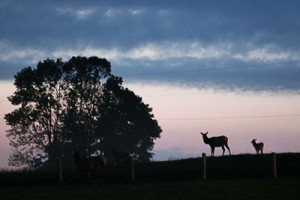 Thanks to Keystone Elk Country Alliance (KECA) and their fine visitor’s center in Benezette, Pennsylvania, I now only need drive two hours to be surrounded by one of the most flourishing elk herds in the country.
Thanks to Keystone Elk Country Alliance (KECA) and their fine visitor’s center in Benezette, Pennsylvania, I now only need drive two hours to be surrounded by one of the most flourishing elk herds in the country.
Growing up in a dry town, meaning one without elk at all, I had grown accustomed to whitetail deer. Though I am a whitetail deer hunter from womb to tomb, I must offer a few confessions. When deer and elk are seen cohabitating the same woods, deer look a lot like frisky little squirrels and elk look a lot like elk. For such sportsmen and women more familiar with whitetail than wapiti, allow me to compare the Cervidae family cousins.
When a whitetail buck tickles a tree come autumn, we refer to the delicate dance as a rub. Less gentle, a brute bull elk unearths and uproots entire trees. Any eyewitness would testify the action as downright timbering or clear cutting.
Both the elk and deer are social, vocal creatures. This is about where the similarities abruptly end. The buck, on his best day, may flirt with a few does. A bull, like the pimp of the pines, has a harem of 20 or more cows. The whitetail grunts, a vocalization not far removed from a sound one might expect from various species of livestock on a farm. A bull elk’s bugle, audible for more than a mile, is seemingly capable of lifting fog. The wapiti’s song pierces the autumn air as it bounds from one mountain top to the next.
Another area of interest is antlers. Whitetail racks are described in total points. A specimen both widely and wildly popular is an 8-point. However, a typical bull with “8 points” would be called a 4 x 4. Such an accurately vivid description brings to mind the sound and strength of a full-sized pickup truck. Truly magnificent bulls often reach 7 x 7 (seven by seven) or greater.
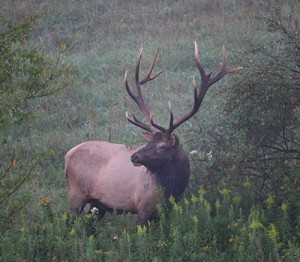 Then there is mass and size. A whitetail deer can tip the scale just larger than my first grade teacher – Miss Take. No one ever accused her of missing lunch. I’d bet during the rut she was close to 300 pounds. A mature bull, weighing in at more than 1,000 pounds, would send the entire 1st grade class of25 flying from the teeter totter.
Then there is mass and size. A whitetail deer can tip the scale just larger than my first grade teacher – Miss Take. No one ever accused her of missing lunch. I’d bet during the rut she was close to 300 pounds. A mature bull, weighing in at more than 1,000 pounds, would send the entire 1st grade class of25 flying from the teeter totter.
Armed with such knowledge, Dad and I ventured east towards the Keystone State’s elk country. Pennsylvania is roughly 46,055 square miles. The country home to the PA elk population is approximately 850 of those squares. This equates to the following assumption: Pennsylvania residents, as they step out their back door, have a 1 in 54 chance of sharing their backyard with an elk.
Spanning portions of 6 of her 67 counties, there are an estimated 1,100 elk currently in Pennsylvania. A whopping 400,000 people take the pilgrimage each year to the Benezette area to see them. Three-quarters of these tourists time the trip between Labor Day and Columbus Day to coincide with the breeding season. It is estimated this eco-tourism rakes in 80 million dollars annually.
Not only is elk one of my vices, so too is gambling. I know of no greater lottery than the play for coveted Pennsylvania elk hunting tags. The lottery will set players back a mere $10.70. This is roughly $.70 more than the premium scratch off ticket currently lining my waste basket. This year, 124 licenses (25 antlers, 99 antlerless) were awarded. Doing the math with any degree of honesty or accuracy, one quickly learns the probability, unless you are immortal, is slim. With roughly 30,000 sportsmen and women chancing it for those 124 tags, odds are less than once-in-a-lifetime. But, if selected, hunters enjoy unmatched success rates. Those fortunate few who draw bull tags traditionally experience greater than 90% success rates. Slightly below, cow success rates are in and around 80%. Growing up on a cattle farm, I sincerely doubt I could do any better for bulls or cows on Grandpa’s back forty.
Once inside the KECA visitor’s center, I was immediately engaged by the entertaining, engaging, and educational materials. When I wasn’t salivating over the lifelike mounts, I stepped inside the 4-D Theater. Aside from my 10th grade report card, I didn’t even know there was such a thing as four D’s. My tour of this well-designed, environmentally friendly facility took place between peak morning and evening elk viewings. Guests from all 50 states and 43 countries have packed into this 12 million dollar, 8,420 sq. ft. phenomenon.
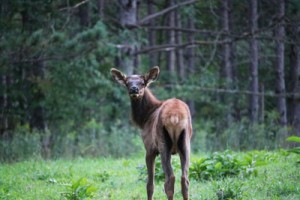 Waking up hours before I would have had I been working, my father and I were the first ones in the Winslow Hill Viewing Area parking lot both mornings. In addition to our dawn details, we spent an evening in and around the Woodring Farm Viewing Area. Conservatively, I witnessed 125 – 150 elk each of my two days. Though many were close enough, I didn’t bother asking any of them if they were repeats.
Waking up hours before I would have had I been working, my father and I were the first ones in the Winslow Hill Viewing Area parking lot both mornings. In addition to our dawn details, we spent an evening in and around the Woodring Farm Viewing Area. Conservatively, I witnessed 125 – 150 elk each of my two days. Though many were close enough, I didn’t bother asking any of them if they were repeats.
Be it book side or brook side in a library or landscape, I had seen and studied elk my entire life. Still, I learned a fun fact on my most recent September trip. Just after Labor Day, I was privy to a patent move experts call an “elk chuckle.” As the bull emits a distinct, unmistakable chuckle, so too does he urinate all over his body. Though I too have endured raging fits of laughter, I proudly have yet to chuckle myself.
Wanting to get as humanly and humanely close as possible to the aforementioned action, I signed up for a horse ride. A few times per evening, visitors can tour the elk behind a horse. As spots fill quickly, I was sure to arrive early. Eagerly, I jumped upon the horse like I had seen in my favorite westerns.
“What are you doing?” asked an official sounding voice.
At about this time the gaggle of elk viewers arrived to the scene. “Y’all know,” I answered, “fixin’ to lead this fine horse an eighth of a day’s ride here into the sunset and see some elk.”
“Oh yeah,” the gruff man chuckled, “this here is a wagon ride. Now dismount from the lead horse and take a seat on the wagon.”
As I dismounted, my right foot became stuck in the stirrup. Onlookers from the wagon giggled and snickered. Their wild children laughed at me too. Still, the wagon ride was unforgettable. About the only way to get any more intimate an elk experience would be to jump on the back of one. At least they wouldn’t have stirrups.
As with any fun outdoor pursuit, so too did this one have an end. To show the wife at home my gratitude, I wanted to get her a bottle of wine. Visiting a local winery, so close to the elk action the beasts likely crushed the grapes with their hooves, I scanned the racks. I was disappointed there wasn’t Bugle Trip or Rut Juice. I would have really loved uncorking a bottle of those with my wife.
The owner approached. Though she didn’t remember my father at all, he remembered her.
“Remember me from school?” Dad asked.
“We went to high school together?” she questioned, likely dialing the police with an emergency built into the bar.
“Yeah!” Dad huffed. Following a large helping of awkward silence, he continued, “Got anything with genuine, local flavor for my boy?”
“How original are we talking?” she smiled.
“I dunno,” Dad paused, “maybe your finest Elk Chuckle. Hey I want you to meet him!” he finished, summoning me towards the counter.
“Hi. My name is Marshall. I am an elk-a-holic.”
Elevation’s Revelations
By Marshall Nych
 Shortly after learning to walk, children try their hand at climbing. Kids soon discover no limbs hold more adventure or offer a better embrace than those of a tree. Little changes when child morphs to adult. Bowhunting is nothing more than adult years imitating former years. I would argue happiness and height perched in a tree are directly correlated. I entertain and chase some of my most original thoughts, best daydreams, and most creative ideas while tangled amidst various species of hardwood. Perhaps something magical happens to the air a few stories off the ground or, maybe, the brain isn’t receiving sufficient levels of oxygen.
Shortly after learning to walk, children try their hand at climbing. Kids soon discover no limbs hold more adventure or offer a better embrace than those of a tree. Little changes when child morphs to adult. Bowhunting is nothing more than adult years imitating former years. I would argue happiness and height perched in a tree are directly correlated. I entertain and chase some of my most original thoughts, best daydreams, and most creative ideas while tangled amidst various species of hardwood. Perhaps something magical happens to the air a few stories off the ground or, maybe, the brain isn’t receiving sufficient levels of oxygen.
Regardless, no time finds me clambering more than October. Come the year’s tenth child, my personal favorite, I spend more time off the ground than I do on it. Local squirrels begin to think of me as an overgrown, awkward uncle. While speaking of my nuisance nephews, when I hunt deer I see squirrels. Logic suggests I should hunt squirrels to see more deer. Such are the whimsical epiphanies and nuggets of logic I stumble upon come archery season.
Relating to the aforementioned squirrels is another brand of rodent – chipmunks. I have observed an alarming abundance of chipmunk while on stand. Rigorous research estimates the Pennsylvania deer herd somewhere in the neighborhood of 1.5 million. I need to find that neighborhood. If the ratio of chipmunk to deer I personal endure is accurate statewide (12:1), this means there are roughly 18 million chipmunks scurrying and chattering about the Keystone state.
You are likely astonished by my height perception (taller cousin to depth perception). Once safely affixed to timber, I offer plenty more such reflections and philosophies. Twiddling my thumbs while waiting for whitetails, I have arrived at some of elevation’s revelations.
Scent Eliminators: My fellow archers strive for complete control over body odor. If the scent eliminating products bowhunters employ are scent-free, why do they have a distinct odor? Should scentless have a smell?
Deer Urine: One of the most important ingredients uniting male and female deer is the very substance causing a rift between human husband and wife – urine. Apparently in the cervidae world, emptying one’s bladder carelessly all over the place is not only socially acceptable, it is celebrated. Not so with homo sapiens.
Nocks: A penny’s worth of plastic is the pastor presiding over the marriage between arrow and bowstring. Scary thought. Any seasoned bowhunter knows the word nock refers more to the lifestyle of the archer – it’s a hard nock life. Hunting from the delicate balance that is a tree stand, the number of things to go wrong vastly outweighs the mere grains of what can go right. Nocks have shattered, fallen off, been too heavy, stuck to the string, and been too light. Newer models of nocks even light up, inevitably leading to frustration when they turn on at the inopportune time or refuse to illuminate when desired.
Arrow Rests: The two most popular varieties of rest are the drop away and the Whisker Biscuit. The former refers to the clumsy action of what happens to most of my gear from the stand – with some assistance from gravity, expensive gear drops away. I once fumbled a quiver full of arrows as a buck closed into range. The latter style rest, the Whisker Biscuit, describes the convenient snack leftover from breakfast amidst one’s beard.
Can Calls: Canned alludes less to the shape of deer calls and more to the quality of hunting on some television programs. Personally, I do not like the cylindrical design. Simultaneously, I once tried to open and drink an estrous bleat while calling a deer in with a Pepsi.
Grunt: If you sound anything like me climbing a tree, you needn’t purchase some fancy grunt call. Save money and make the sound yourself. As I am slinking up the tree my grunts and groans have frequently enticed deer. Come to think of it, I have called more deer in while grunting up the tree than grunting in the tree. Admittedly, I am uncertain as to whether they are drawn by the sound or the desire to heckle such a poor specimen.
Stabilizer: Most bowhunters immediately think stabilizers are the weighted nubs affixed to the ends of their bows. Such tools deliver balance during the shot. Companies need to figure out a way to attach a stabilizer to the actually bowhunter.
Safety Harness: This lifeline prevents accidentally falling from the tree stand. Ironically, the safety harness is also the bulky contraption preventing you from buckling your seat belt and the very cause of swerving into a tree. Not having been wrapped in as many cords since birth, officers will save you from the wreckage and exclaim, “Wow! This one is an astronaut or something!”
Quiver: The term is less noun than verb. Quiver is the side effect of buck fever often blamed for a complete miss. The hunter’s quiver forced a humble retreat into the quiver for another arrow.
Nocturnal: The typical bowhunter complains deer have inexplicably, irreversibly gone nocturnal due to daytime activity and increased hunting pressure. I have devised a way to combat such phenomena. If daytime activity makes deer come out at night, then nighttime activity should cause deer to come out during the day. I would recommend late night activities, ranging from midnight meanders through prime habitat to thicket poker nights with guys.
Deer Movement: The only deer movement I seem to inspire and/or witness results in a pile of what appear to be chocolate covered raisins.
Fashion: Likely one of the most unlikely concerns to bowhunting brethren, I recently received a fashion consultation from my hunting crew. The guys constantly rag on me about my rags and tease that I am too cheap to buy new camo. Donned in my time-tested, tattered and torn clothing, I descended the stand to help some buddies with a blood trail. Arriving to the scene, the group cheered in unison, “Hey, Marshall bought a fancy new ghillie suit! It’s about time.”
Imagine their surprise when I answered, “This isn’t a ghillie suit…”
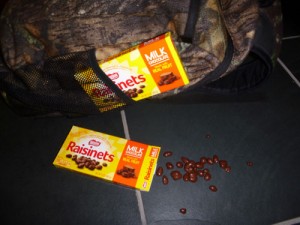 Snack: Archery season isn’t all seeing deer and shooting at bucks. As the hands of time suffer from arthritis, one’s tank begins to empty. To fuel long sits on stand, I pack snacks. None are better than products of the cacao bean, especially the chocolate covered raisin or peanut variety. Such caloric cravings caused yet another revelation. Nonchalantly rolling raisins down the runway to my mouth, I fumbled nearly the entire box. Upon departure, I immediately looked for my sweets. It became apparent the dipped raisins I had dropped just 20 feet above now looked strikingly similar to the droppings deer deposit (see Deer Movement). I closed my eyes, held my breath, and tossed a handful into my mouth. I have regretted my hunger-driven decision ever since.
Snack: Archery season isn’t all seeing deer and shooting at bucks. As the hands of time suffer from arthritis, one’s tank begins to empty. To fuel long sits on stand, I pack snacks. None are better than products of the cacao bean, especially the chocolate covered raisin or peanut variety. Such caloric cravings caused yet another revelation. Nonchalantly rolling raisins down the runway to my mouth, I fumbled nearly the entire box. Upon departure, I immediately looked for my sweets. It became apparent the dipped raisins I had dropped just 20 feet above now looked strikingly similar to the droppings deer deposit (see Deer Movement). I closed my eyes, held my breath, and tossed a handful into my mouth. I have regretted my hunger-driven decision ever since.
Descending from my thinking chair, which happens to double as a tree stand, I quickly return to mediocre, mere mortal thoughts. Once grounded in day-to-day life, such revelations elude me. I trudge on knowing clarity will come again the moment I clamber the rungs to sit upon my throne. I, like many, am a philosopher of the hardwoods. I think, therefore I am. I am, therefore I hunt.
By Marshall Nych
Marshall Nych’s habitat is a family farm in New Wilmington, PA. When Marshall isn’t writing outdoor humor, he is an elementary teacher misguiding the youth of Mercer County. Although Nych has fished 15 states and 4 countries, his best catches remain his wife and daughter.
Going with the Grain
By Marshall Nych
As a boy, rarely did I do as I was told. School bells sounded to a young man daydreaming about the woods and waters. At heart, I was a wild creature confined by the classroom, tamed by a schoolmaster. Once home, chores were often overlooked to chase the very places I had daydreamed about all day at school. Mothers and teachers alike would inquire, “Marshall, why do you insist on going against the grain?” The expression, like other figures of speech, made little sense at the time. Still, there were men who not only led such lives…they did their best to encourage mine. Some were men I knew at birth, like my Dad and Grandpa. Others I would come to know during life’s later chapters. Such was the story of my father-in-law, Jim Harper.
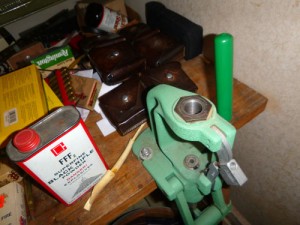 Only when I reached an age my father entrusted me with gunpowder did I come to understand quotes about grains. Sure the pellets chambered in my airgun’s barrel seemed coated with some type of mysterious powder. Though it certainly wasn’t combustible, my delusions believed it to be diluted gunpowder. Admittedly, I was not to admire the art of reloading and handling gunpowder until the age of twelve. This was the year boys of Pennsylvania mysteriously matured into young men of the woods. I quickly came to respect the notion of “going against the grain.” Now a hunter, I delightfully adhered to a facet of my life I could finally go with the grain – reloading.
Only when I reached an age my father entrusted me with gunpowder did I come to understand quotes about grains. Sure the pellets chambered in my airgun’s barrel seemed coated with some type of mysterious powder. Though it certainly wasn’t combustible, my delusions believed it to be diluted gunpowder. Admittedly, I was not to admire the art of reloading and handling gunpowder until the age of twelve. This was the year boys of Pennsylvania mysteriously matured into young men of the woods. I quickly came to respect the notion of “going against the grain.” Now a hunter, I delightfully adhered to a facet of my life I could finally go with the grain – reloading.
Reloading offers many advantages for sporting men and women. Positives range from the clear cost effectiveness to precision and accuracy. This pair of aforementioned pros of reloading are frequently written about and articulated in popular outdoor magazines.
However, truth be told, I am not a technical man who can boast producing the world’s most accurate loads nor a scientific man who can present state-of-the-art ballistics. My focus settled on a third joy of reloading – the bonds formed. Once nestled into a reloading den, the delicately precise relationship between the numerous ingredients is not the only ones present. Boys observe the hands of fathers who learned from grandfathers.
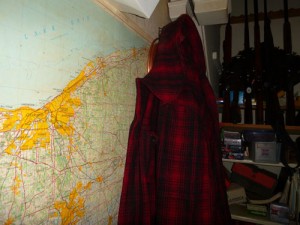 Chronologically, my first teacher was my father. Dad’s reloading room had been strictly off limits to a dangerously curious boy who had a tendency to play with matches. As each season passed, I grew more intrigued by the innards of the den. The ban was lifted the year I was a licensed hunter. I recall the hairs stand on the back of my neck as Dad commanded, “Come in here Marsh.” Once I began drawing breath again, I began to notice the detailed hunting maps adorning the walls, save the southern end. This wall was trusted with the important task of holding his guns. Strewn about on a thick hardwood table with green metal cabinets were reloading tools, dies, gunpowder, and bullets. The smells of this factory were something the olfactory of a twelve-year-old could never forget.
Chronologically, my first teacher was my father. Dad’s reloading room had been strictly off limits to a dangerously curious boy who had a tendency to play with matches. As each season passed, I grew more intrigued by the innards of the den. The ban was lifted the year I was a licensed hunter. I recall the hairs stand on the back of my neck as Dad commanded, “Come in here Marsh.” Once I began drawing breath again, I began to notice the detailed hunting maps adorning the walls, save the southern end. This wall was trusted with the important task of holding his guns. Strewn about on a thick hardwood table with green metal cabinets were reloading tools, dies, gunpowder, and bullets. The smells of this factory were something the olfactory of a twelve-year-old could never forget.
Dad reloaded most, if not all, the various calibers at one time or another. There was his preferred pistol, the .44 Magnum. Both my father and his favorite actor Clint Eastwood packed this caliber. As a boy, I could scarcely discern between the two. Still, Dad truly made his mark as a hunter and reloader with Pennsylvania’s state bird in the sights. A ruffed grouse skillfully to hand was few and far between, even for the guys who knew what they were doing. My father was one who could out walk his dog. He limited most trips. In fact, Dad’s best year claimed 26 birds.
I still remember the reloading press. The shotgun hulls were always red. Though my father was a frugal man, Dad freely shared his shells with his three sons. All of whom suffered itchy trigger fingers. Upon missing the first few flushes, I’d playfully accuse, “What’d ya’ forget the lead when you reloaded this batch?” Dad would quietly grin then promptly drop the next bird to take flight. I watched this man swing on a grouse like a professional ball player hones in on the ball. On one hand, I can count the number of trips I lucked into more grouse than my father. Countless are the times I admired his reloading den, perseverance, and inhaled wafting gunpowder.
On my best day I was only a good grouse hunter. Still, the competitive streak of a young man in peak physical condition admired how Dad was still best in the grouse woods. Though I was good at grouse, I honed my skills until I became great at deer hunting. It was Grandfather’s hands who taught to shoot sure and steady with the rifle. Those determined, calloused hands, when they weren’t working the farm, were hunting or reloading his .30-40 Krag. Though less than 40 grains of powder, the gun held more sentimental value than a boy could possibly understand. Older brother Jule, a soldier during World War II, passed down the military rifle to his brother Adam, who ended up my grandfather. Though I recall Grandpa grumbling about the difficulty of tracking down dies or materials for the .30-40 Krag, I never once heard Papa complain about hunting, farm work, or anything other obstacle in life.
To a man as strong as Grandpa, grain had two distinct meanings. Grains referred to his livelihood from planting to picking. But, once the harvest had concluded, Grandpa measured a different grain. The patriarch of my family planted a 180 grain bullet atop 36 grains of powder. Like pulling the tractor perfectly into the barn, Grandpa would seat the bullet into the bottleneck casing. Similar to his symmetrical rows of corn, my grandfather would line up the finished cartridges.
Grandpa and I, of the many men in the family who hunted, harvested the most whitetails. Though Grandpa took many antlered bucks, it was a doe he dropped with one of his reloads I will never forget. Getting upward in age, Grandpa was confined to shorter hunts closer to home. One such trip took place along a thick fencerow between his pastures and the property he graciously sold me. Seeing darkness and dogged drivers approaching, Grandpa began unloading his trusty Krag. Then, with only the round in the chamber, a doe surprised everyone when it rocketed out of the thicket. Knowing he had only one shot, Grandpa skillfully traced the deer’s movement with his .30-40’s open sights. At the report, at nearly the length of a football field away, the doe buckled like the dozens before it. Grandpa was 85.
My most recent teacher was my wife’s father. Ironically, I nearly asked Jim Harper’s permission for his daughter’s hand in marriage one day we happened to be on the range. We had been target practicing with some of Jim’s reloads. Not yet knowing his accuracy, I opted to wait for a later, safer occasion to pop the question. More than a decade later, I closely associate Jim with the outdoors, muzzleloading, and reloading. If you’re still wondering, Jim granted permission. We have since enjoyed many days afield chasing game and many evenings reloading. Our words echoed through his cellar reloading den. God willing, Jim will one day teach his grandson Noah how to reload a .54 caliber flintlock with 80 grains of FF and a lead ball.
I am now the proud owner of a fine shotgun Dad surprised me with the day I graduated college, the sentimental rifle Grandpa took to the woods, and an antique muzzleloader Jim gifted when I married his lovely daughter. I figure it’s a fine time to go with the grain and start reloading.
By Marshall Nych
Marshall Nych’s habitat is a family farm in New Wilmington, PA. When Marshall isn’t writing outdoor humor, he is an elementary teacher misguiding the youth of Mercer County. Although Nych has fished 15 states and 4 countries, his best catches remain his wife and daughter.
A Survival Guide for Minnows
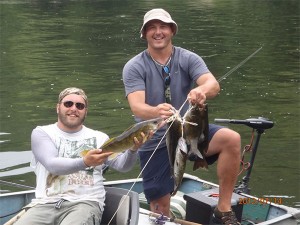 Cast number one-thousand, two hundred eighty…same result as cast number one – nothing. Fishing with my younger brother Ryan just the other day, catching our usual limit of invisible, we started to discuss the hundreds of tiny dilemmas facing each cast into the fray. Every variable and possibility puts the favor in the fish’s corner. It seems any attempt that doesn’t land directly into a fish’s open, yawning mouth is ignored as if it were a book on Christmas morning or Brussels sprout on Halloween.
Cast number one-thousand, two hundred eighty…same result as cast number one – nothing. Fishing with my younger brother Ryan just the other day, catching our usual limit of invisible, we started to discuss the hundreds of tiny dilemmas facing each cast into the fray. Every variable and possibility puts the favor in the fish’s corner. It seems any attempt that doesn’t land directly into a fish’s open, yawning mouth is ignored as if it were a book on Christmas morning or Brussels sprout on Halloween.
On this particular outing we were plagued by floating grass. The vast majority of our retrievals looked like a plate of salad skipping through the water. The smallmouth bass we were targeting must not have been leaf eaters or, at the very least, preferred a different salad dressing.
Ryan, upon reeling in a hefty chunk of milfoil, hollered out, “Looky here Marshall, got another one!”
Congratulating my younger brother on his catch of greens, “That one has to be at least fifteen inches!”
Ryan, as he removed the health food from his hook and tossed it directly into my lure’s path, continued, “If I was a minnow, I’d swim around with a piece of grass in my mouth. No fish would even bother looking at me!”
This got us to reflecting upon all of the survival tricks we had learned through our years of failure while trying to catch big fish with our bait fish. And so began the great bait debate. Prior to these theories, minnows likely thought debate was the storybook ending where the repenting fisherman gently removed bait from the hook and safely released them back into the water.
The following guide can be applied to all watersheds, both river and lake, and by all bait fish, species of salt or fresh water, to evade predators:
For starters, anytime I pinch on a splitshot sinker to get my bait down to the fish, the added weight is detected more easily than a tattoo on the girl brought home to meet a discerning mother. Like prisoners dragging a ball and chain, minnows too should carry a sinker closely behind. Predaceous bullies would never try to take their lunch money or, more importantly, eat them for lunch again.
As my younger, wiser brother alluded to earlier, let us cover the Hawaiian tactic. Here, minnows utilize grass, scum, or a variety of other flotsam to disguise as rabbit food. The more grass in the skirt, the better. We have seen this trick in the human world when those going undercover disguise with fake mustaches and beards. The same principle applies to this situation, but with algae and rock snot.
Another inexplicable phenomenon Ryan and I had observed is how selective fish are to the texture, freshness, and appearance of the bait. If the minnow, worm, or other popular bait choice are not perfectly smooth and supple, the snobby fish put those tiny two holes they call a nose up in the water column at the offering. Hence, minnows and other baits should get some sun to appear shriveled and undesirable. Apparently fish do not like jerky. Not only will this survival tip equate to not getting devoured by a toothed apex predator, the prey will sport a nice tan.
I am sure, just as Ryan and I have experienced, many anglers pursuing pressured fish can relate to the shiny hook warding off trophies. To get a taker, the hook has to be completely and perfectly concealed by the bait…or made of chocolate. With this in mind, minnows need only get their fins, lips, and other fish parts pierced. These metallic flashes will trick lurking lunkers into thinking, “Can’t fool me! This guy may taste delicious, but I can clearly see he has a hook in him.”
I have fooled very few fish in my years fishing. Of that unfortunate, unintelligent sub- group of the population, none were duped with a dead minnow, dead worm, dead grasshopper, or dead anything. Walleye, musky, and other sporting fish enjoy the kill. They do not want somebody else already having done the fun part. Therefore, it would serve prey species well to enroll in a few introductory acting classes. Nearly every drama has a climatic death scene. The bait fish too can learn to play dead. Once the art is mastered, the minnows can become snobby, gather in fancy grottos, and nominate each other for awards celebrating their acting skills. The Chummy Award would go to the winner of various categories. Naturally, there would be Closest Call, Best Flop, Longest Performance, and Funniest Reaction by Predaceous Species. Check local listings for specific times.
Fish I like to catch, fry and eat, particularly the walleye, possess an innate ability sense my fishing line. I’ve tried everything from lighter pound test to lines that boasted invisibility. Nothing has worked. The minnows can use my mistakes for their betterment. If bait fish affixed snug, little monofilament nooses around their necks, all discerning predators would call it quits once they thought the morsel was tied to a line.
This survival guide can help liberate and free forage fish. There is now a prayer for prey fish. The time has come to employ craftiness to put a kink in the traditional food chain. The time is now to utilize intelligent ingenuity to tangle the stereotypical food web. I am sick of larger, charismatic mega fauna always winning the fight. I for one am rooting for the underdog…the cute, helpless puppy of the fish underworld – the minnow.
The tricks my brother Ryan and I discovered will work for generations of bait fish. Gone are the pathetic days of schooling up and merely relying on large numbers to survive.
Hopefully, God willing, in the not so distant future, the game fish of the world will somehow get their fins on a copy of the survival guide. The walleye, bass, trout, pike, musky, and other desirable species will figure out all of these tricks. Maybe then I will start catching fish.
Ode to a Math Teacher
By Marshall Nych
I used to be a happy outdoorsman, blissfully unaware of the mathematics lurking behind the sporting world. Sadly, I began teaching math to grade school children. I couldn’t help but plug in equations to my real life and, worse yet, to my passion for the outdoors.
Funny, had you been privy to my mathematic prowess that was high school algebra, you wouldn’t believe I was a real teacher today. From Pre-Algebra to Trigonometry, I singlehandedly transformed my highly motivated, certified teachers into highly frustrated, certifiable teachers. When Mrs. Brinkman, my Algebra I and II instructor for four years, told me to “Find x”, I took her literally. Going through many lengthy equations stolen from advanced life forms of a distant planet, I simply found x and circled it in each of the problems. Easier than a word search, this, I assumed, was a letter find. Upon discovering x in each exercise and on every page, I proudly handed in my test to Mrs. Brinkman. I couldn’t figure out why the other kids had such a hard time. Looking back now, it took some of them hours to “Find x.” Dummies.
The next class, Mrs. Brinkman gave me a new letter to find. She could have made it a bit more challenging—the red ink and large font were dead giveaways. Though it looked strangely similar to yesterday’s test, I had no problem finding F.
Below, I have taken the liberty of spoiling all happiness equated to deer hunting. First, I will provide the equation. Next, I will offer an explanation to each of the variables. Finally, I will plug in real numbers and solve various facets of hunting. If done properly, the result should be a fairly accurate breakdown to various unit costs and prices per pound associated with outdoor sport.
To determine many of the variables, I estimated and averaged. For example, I assumed the average sportsman gets 10 years out of a truck and a bow. For the sake of simplicity, I allotted 50 years for rifles. Located atop is a table of variables used for each specific math problem.

Arguably at the very heart of any adventure and well-hatched plan, there’s an old pickup. Here we solve for a truck. First, truck equals the cost divided by life of vehicle. Once we have this value we must factor in work, family, and sporting endeavors. To do this, I split a week into a fraction. The typical week, the truck is used for work five of the days, family activity one day, and sporting endeavors the remaining day. Finally, this figure is rounded and divided by two to determine the vehicular annual cost for each hunting and fishing. For the remaining mathematical equations (ones requiring a truck anyway), this number will be plugged into appropriate aquatic or terrestrial equations.

Man, one outdoor problem down! If your head is anything like mine, it hurts. Therefore, we will use t = $215 annually for each hunting and fishing.
![]()
Now we have fixed up our truck, we need to fill ‘er up. This quick problem will determine the value of fuel used for outdoor pursuit. Fuel will equal the average gas price written at the time of this piece multiplied by one-seventh of miles driven (remember how we divided the week). The average driver puts about 12,000 miles on a vehicle (or so my insurance company threatens). Those twelve thousand miles divided by the one day per week for outdoor endeavors gives you 1,714.29 miles. Assuming I get around 17 miles to the gallon, generous for any off road trek, I need 100.84 gallons of fuel for hunting and fishing.
![]()
Since this story will cover fall and winter activity, the year’s fuel is distributed equally among the seasons. $352.94 split two ways is $176.47.
![]()
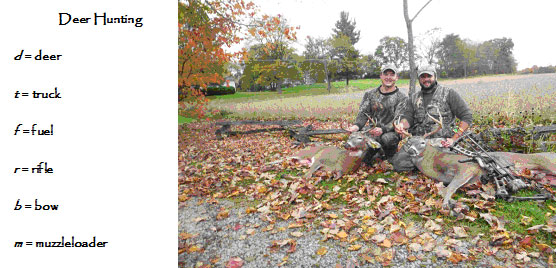

On a recent stint at the local grocery store, steaks were a searing $7.00 per lb. and ground beef rolled in just under $4.00 per pound. Let us see how venison fares when we grill the numbers.
Now the truck is gassed up and accounted for, we can cruise into the other costs. First and foremost is the rifle. Let’s load the formula with $1,000 for a dandy high-powered rifle, quality scope, and sling. Though not always the case, we will daydream about getting 50 years of hunting from this reliable rifle. This yearly budget of $20 is extremely conservative. While it does showcase one excellent specimen of rifle, the figure assumes the hunter is limited to a single firearm in the rotation.
Since, many hunters take full advantage of all seasons (archery, firearms and muzzleloader), I will include the price of these two alternative hunting implements. While my bow is a prehistoric fossil by modern standards, many compounds fetch $1,000. For the guys who avoid the pricey flagship models, I will allow this four-digit figure to encompass all sights, rests, arrows, etc. I have heard bows are like Presidents…get a new one every four years. My corrupted Hoyt is just finishing its third term. However, I will assume bowhunters squeeze five years out of their limbs. With respect to muzzleloader season, you can get all the fixings for flintlock for about $500. Again, we will apply the theory of a gun lasting fifty years before handing it down. To load our three devices with bullet, broadhead or round ball, I tacked on a $50 annual cost for ammo.
Equipment, as any sportsman who as thumbed through the one-tree-equivalent catalog can see, is open for much interpretation. Over the years, I have transitioned from placing a catalog on my coffee table to using the catalog as my coffee table. I will be as simple as possible and incorporate a miscellaneous spending fund to cover diversified needs. Generally, main equipment includes tree stand ($150), hunting pack ($75), knife ($50), binoculars ($200), range finder ($150), deer call ($20), and scent products ($20). My attempts were to reflect middle of the road pricing. Also, for matters of simplicity, I will calculate the price for a single unit into the formula. Many items are collected over a lifetime of hunting and last many years. For instance, a good knife could last forever and hardcore hunters may own more than twenty stands. To accurately reflect hunters gradually accumulating equipment, I would bet most have what they need in a five-year window. Of course there are many small and strange things, so I will add an additional $50 per year for miscellaneous equipment needs to the $133 main equipment cost.
A man hunting can get more carried away with clothing than a teenage girl at the mall. I am surprised we haven’t seen hunting fashion shows where men in camo sneak down the runway. I use realistic costs of the bare essentials and provide unit prices. Clothing will include hat ($20), gloves ($10), jacket ($100), shirt ($50), pants ($75), base layer ($50), socks ($10), and boots ($150). Let’s assume clothing will last 5 years. While it’s true some grandpa may have a hunting hat since the birth of his first born, at some point he likely tore brand new pants on his first trip of the year. c = $465/5 = 93
PA resident hunting license, as of this writing, was $20.70 plus 2 doe tags at $6.70 a pop. Throw in archery and muzzleloader privileges and it shakes out to $62.50.
Being slightly optimistic, let’s say our hunter harvests a buck during archery and an average doe in firearms season. Obviously, the hunter couldn’t hit anything with his flintlock. Their dressed out weight (for you do not buy burger based on live weight of a cow) are as follows: buck dressed at 165 lbs. and = 80 lbs. of boneless meat, while the doe dressed at 120 lbs. and = 50 lbs. of boneless meat.


Assuming the hunter harvests two whitetails, d = $504.99 per deer

Assuming the hunter harvests two whitetails, d = $504.99 per deer
Hence, price per pound of boneless venison is $7.77
It is often said time outdoors is priceless. Perhaps overpriced is more fitting. Armed with a rough knowledge of how much hunting costs me, I think I may take up more worthwhile hobbies, say burning money. Hopefully, you have gained something from this celebration of the nature of mathematics and the pure mathematics of nature. I cannot be held liable for any spouse reading this story and suspiciously saying, “Dear, please start handing me your paycheck directly.”
Numbers cannot lie. This is precisely why I prefer words as my medium.
By Marshall Nych
Catching Mickey
Growing up, I admired my father and older brother. These two men were something I thought I’d never become – avid trappers. Whether seated at the dinner table with family or the card table surrounded by hunters playing euchre, the word trapping meant one thing – fox trapping. Both Nych men were blessed with God-given trapping talents involving the smarts, perseverance, and finesse it takes to fool a fox. I, on the other hand, was skipped over when such gifts were bestowed. I could scarcely tie my shoe. That was about it.
Hence, boot laces haphazardly strung, I was at least given the chance to tag along and attempt at keeping up with my heroes Dad and Nathan. Unbeknownst during my formative years, tips and tricks I picked up would serve me well decades later. Knowledge and techniques for catching nature’s notoriously sly fox could easily be adapted to assist the man of the house trap the mouse of the house.
 Such was the case the fifth winter into our mortgage when my wife Laura found grotesque evidence of our first rodent resident. My daughter endearingly named the new tenant Mickey and the evidence he so graciously left behind chocolate sprinkles. A misspent childhood stumbling around with Dad and Nate came tripping back to me. I was destined to apply what I had learned from my mentors. In this battle of mice and men, I would do my part to ensure man would emerge triumphant.
Such was the case the fifth winter into our mortgage when my wife Laura found grotesque evidence of our first rodent resident. My daughter endearingly named the new tenant Mickey and the evidence he so graciously left behind chocolate sprinkles. A misspent childhood stumbling around with Dad and Nate came tripping back to me. I was destined to apply what I had learned from my mentors. In this battle of mice and men, I would do my part to ensure man would emerge triumphant.
First and foremost, I learned from Dad what husbands can and cannot do with respect to outdoor sport. For example, messing up the kitchen with a batch of deer jerky – one time per year maximum. Swapping fox lure for wife’s favorite cologne – never. Mom also mandated all outdoor equipment be trusted to the garage and/or basement. The interesting dynamic that was a wild woodsman, frontier father with a mild mannered mother, I witnessed the rare, magical moments they were tenderly forced together. Outdoorsmen benefit from the unique skill set of keeping their cool with crazed critters. To men like my father, trespassing bats, unwelcomed snakes or renegade raccoons merely marked the spot on treasure maps leading to my mother’s heart.
Mickey, likely having snuck through some sliver, now exposed the greatest window of opportunity. Catching Mickey became my chance to secure eternal love and respect from my wife and daughter.
Dad instilled within my credit card wielding paws a lesson on quality. “One good trap is worth a hundred cheap ones,” he’d grumble, cleaning his reliable Duke #2 coil set. Ironically, the same number was branded on pencils his trap snapped in half during my boyhood experiments. At thirty-one years old, owning my own home and being owned by my wife, I was kindly ordered to fetch some mouse traps from the local hardware store. I recalled my father’s advice. I heroically marched through the threshold armed with instruments tuned to play the sweet music of rodent death. From adhesive glue to the traditional spring, I had every tool at my fingertips. Some traps were crafted of wood, others molded plastic. I was ready for Mickey.
Nate possessed a sincere gentleness and fostered a deep respect for the animal. “Only run a line you can handle. That’s the least you can do for the animal.” I took note of this. My trap line was confined to the basement. I drew the line with respect to traps in bedrooms and other living spaces where man was more likely to stumble into the trap than mouse. I didn’t want to spread myself too thin checking traps on a daily basis. Plus, my toddler Leah only found sprinkles in the cellar.
Father ingrained in me that trap placement was a vital chapter to the story of success. “You can have the best farm, but if you don’t know where to set up shop you’ll be scratching your head ‘stead of skinning a fox.” I researched mice and found they rarely travel across wide open spaces, preferring the safety of walls and cover. Hence, my sets peppered the entire perimeter of the basement.
 Unlike Dad, Nate took pride in style. Where Dad would slap on any pair of work boots and his ole Carhartt’s, Nate donned fine leather boots and a furry trapping hat. Decades later, I need only glance at my favorite photo of Nate proudly holding his first fox to remember the significance of dressing the part. Inspired, I turned to my personal fashion consultant – three-year old daughter Leah. She strongly suggested Mickey Mouse ears. Made sense. Each time the basement door creaked, the shadow of the trademark ears lurked down the steps, I felt as though I was part of something quite opposite of those televised Disney family vacation advertisements.
Unlike Dad, Nate took pride in style. Where Dad would slap on any pair of work boots and his ole Carhartt’s, Nate donned fine leather boots and a furry trapping hat. Decades later, I need only glance at my favorite photo of Nate proudly holding his first fox to remember the significance of dressing the part. Inspired, I turned to my personal fashion consultant – three-year old daughter Leah. She strongly suggested Mickey Mouse ears. Made sense. Each time the basement door creaked, the shadow of the trademark ears lurked down the steps, I felt as though I was part of something quite opposite of those televised Disney family vacation advertisements.
Practically ready to set my own traps, a final lesson on lure wafted amidst trapping adventures with my father. Organizing little brown glass bottles, Dad posed, “You ever hear the saying ‘bout bringing a horse to water, but ya’ can’t make him drink.”
“No,” a ten-year old me shrugged confusingly. I found print, much less morals to stories, far less appealing than the pictures.
“Not surprised,” Dad continued, “well a fox can come to your trap, but you can’t make ‘em step on it. Unless you’ve got lure. That’s how to seal the deal.”
Dad employed a cunning combination of food lures and gland lures. Preferring not to enter the world of mice glands, I opted for the former. What better way to a mouse than through its stomach? So many choices. Should I enhance the set with cheese or peanut butter? There were even more decisions to be made with each choice. What cheese would Mickey prefer; American, Provolone, or Limburger? If I used peanut butter, should I go with creamy or chunky? How about brand names? My indecisiveness led to some unique combinations and a bill equivalent to a week’s groceries.
One plus to mouse trapping, or mousin’ as I coined my new hobby, was the fact trapper could sample treats. Never had I snacked on Father’s fox lure. However, I gluttonously gobbled cheeses in hopes of removing the peanut butter from the roof of my mouth. I guess I would have made a good mouse.
Call it beginner’s luck, but my second day running the trap line found a spring sprung. Disney must be a strong bond, for Mickey fell to the trap caked with Peter Pan peanut butter…creamy of course. The green fairy’s betrayal to his fellow character literally ensured my mouse would never grow up.
Dad’s toughness and general unpleasant demeanor helped fetch top prices for his pelts. Nate, who went to great lengths to ensure his furs were in prime condition, also became accustomed to upper end compensation. Rather than handing me the pile of money I had imagined, the fur dealer threatened to provide me with a restraining order if I didn’t pick up my mouse and leave his establishment at once. Apparently, a single mouse hide is offensive. I shouldn’t have worn the Mickey ears.
True my dear father and brother were the only Nych men to fool vulpes vulpes. Still, I am proud to have mastered the art of trapping mus musculus. Sorry Minnie.
By Marshall Nych
Meat Trophy
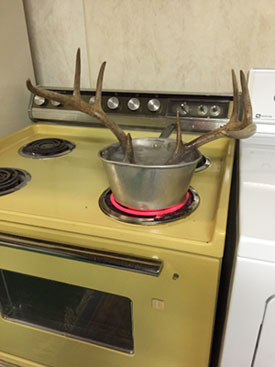 Cutting through the thick carpet of fall foliage of an early season deer hunt, battle lines have been drawn. A month or so later, come firearms season, the same boundaries extend across a fresh blanket of winter snow. On one side of the bout are sportsmen and sportswomen. One might assume the opposing side hosts anti-hunters, animal rights activists, and the like. Wrong. Sadly, it has become commonplace for hunters to align against each other on a number of issues.
Cutting through the thick carpet of fall foliage of an early season deer hunt, battle lines have been drawn. A month or so later, come firearms season, the same boundaries extend across a fresh blanket of winter snow. On one side of the bout are sportsmen and sportswomen. One might assume the opposing side hosts anti-hunters, animal rights activists, and the like. Wrong. Sadly, it has become commonplace for hunters to align against each other on a number of issues.
Even at an early age, divisions in the sporting world rear their ugly, divisive head.
The year Nintendo was released to the masses I was six years old. After just dose, all of my buddies and I were addicted to Duck Hunt and other shooting games involving that bulky, gray gun. Three decades later, similar video games combine cartoon and hunting.
Half of my friends, including me, fell into the high scorers club. This group of digital hunters could be seen shamelessly too close to the screen. As soon as the digital duck flushed or cartoon clay was thrown, the trigger was pulled. Mere inches from the tube, misses were few and far between. It was a simpler time.
The other half of my buddies, the elitists, did not condone such behavior. Their noses were straight in the air the entire 5½ feet hike, which was the length of the cord attached to the gun. These sporting guys rarely connected with the TV target and never punched in their initials on the high score screen.
Those digital ducks, whether harvested by an extended cord or the screen shaver, scored the same number of points and, to me, the same level of satisfaction. Neither side had a lasting impact on the population or migration of Nintendo waterfowl.
Aside from trading the bulky, mysteriously calibrated gamers’ gun for the real thing, not much has changed. The sporting world seems just as hectically divided now an adult as it was when I was but a child.
Bowhunters argue with riflemen pertaining hunting implements. As soon as that squabble subsides, archers fill their quivers with other quarrels. They begin disputing amongst other archers about kinds of bow, material of arrow, types of broadheads, and legalization of crossbows.
No better, when the gun guys escape the wrath of the bowhunters they bicker about optics. A few who use open sights are not always open-minded, while some with scopes see in tunnel vision. When the perfect caliber debate finally subsides, gunners swing into a tussle over the best overall action – bolt, lever, or pump.
Hunters are not the only sporting men and women who are divided. There’s enough tension within the world of anglers to snap even the strongest fishing line. Ever have a purist fly fisherman and a diehard bait fisherman in the same boat. It’s a real treat. After the entomologist is done beating on the worm dunker, he begins busting other fly fishermen as to types of flies. While that fight may be the fight of the night on pay per view, many other bouts lead up to the main event. Dissension exists with respect to type of boat, spinning gear or baitcasting, and saltwater versus freshwater.
The score I want to settle today is a rivalry as timeless as the Hatfield’s and the McCoy’s. Let us focus our sights on the tumultuous relationship that is “Meat Hunters” versus “Trophy Hunters.” Their very names suggest stereotypes. Examining common misconceptions and investigating each perspective may prove a worthy endeavor.
Meat hunters endure many unfair judgments. It is assumed to fill both tag and freezer, such a sportsman is neither sporting nor a man. Those opposed to such hunting motives often site these hunters as unsafe, unlawful, and unethical. Fallacy claims the sole mission of the meat hunter is to “kill & grill.”
Truth be told, a large percentage of hunters, when surveyed, would say meat is one of the primary reasons for being in the woods. Firsthand, I know many such hunters – namely my father. While I can make many wild claims about Dad, being a bad hunter or poor sportsman is not one of them.
Trophy hunters suffer their share of lackluster labels. Wrongfully, their opposition argues trophy hunters are selfish and hunt for the wrong reasons. Critics claim trophy hunters are motivated only for social status with primary purpose being to “tag & brag.”
Encountering many trophy hunters throughout the years, I find most are wonderful stewards. More often than not, trophy hunters have a strong background in biology and understand sound science and wildlife management.
I heard of an unpleasant encounter between the two sides. A trophy hunter approached a successful meat hunter in the field. The deer at the center of the argument was a 1½ year old Pennsylvania buck. Eight small points were distributed somewhat evenly along a foot long spread.
Shaking head in disgust, the trophy hunter sneered, “He would have been a whole lot bigger in a couple of years. Should ‘uv let ‘em grow boy.”
The young hunter, put on defense by such an attack, reverted back to his grandfather’s saying, “You can’t eat the antlers!”
Having heard this argument a thousand times before, and by better debaters, the clever trophy hunter had a witty response, “True, but you can’t decorate your hunting den with a piece of meat on the wall.”
And so the shared low opinion of one another and misunderstanding to the other’s entire fundamentals continued.
Unbeknownst to the feuding rivals, they actually depend on each other. A symbiotic mutualistic relationship if you will. Allow me to explain. Trophy hunters need meat hunters, for if all meat hunters adhered to such a high standards and discriminating selection process during the hunt, all deer would be mature, perfect specimens. This imbalance would cause what was once a rarity to no longer be prized. If every deer was a trophy, no deer would be a trophy. Meat hunters must understand they too require trophy hunters, for if all trophy hunters took the maximum legal animals, the population would arguably be reduced. This decline of deer to hunt would inevitably result in deprivation of protein on the dinner plate.
In the ideal world, a utopia sans sportsmen taking opposing sides, the aforementioned conversation would go something like this:
Proud of his fellow deer hunting brethren, the very future of the sport, the trophy hunter grins, “Hey buddy. Congrats on the buck!”
The young meat hunter, still overjoyed from the experience, says, “Thank you Sir…it’s my first one! You see anything today?”
As if starting a hunting story for a friend, the trophy hunter relays, “Yeah. A few early on. Just on the other side of those pines. Nothing I couldn’t let walk to a nice kid like yourself or grow bigger next year. I got a real dandy in these same woods a few years back.”
Marveling at the trophy hunter’s experience, the meat hunter asks, “Got any pics of it on ya’?”
The boy’s statement makes the trophy hunter laugh. “Every hunter carries a picture of his family and his biggest buck!”
Both hunters chuckle.
The trophy hunter hands the worn photograph to the meat hunter, “Looky here.”
Pure awe sweeps across the meat hunter’s face, “Wow! Someday I’m gonna’ get me a deer like that!”
“Now wait a second son,” the trophy hunter reminds, “you seem just as happy today as I did that day.”
With a handshake, the meat hunter agrees. In silence, each grips a side of the antlers. Together they begin the drag.
Can a trophy be enjoyed as meat? Can meat be prized as a trophy? I say yes. A hunter, in the truest sense of the word, should be both at once, an unforgiving predator with a keen discernment and rare respect for the health of prey.
It’s time for the meat hunters to drop back a few paces from the television screen and appreciate the challenge of the hunt. Meanwhile, trophy hunters might benefit from taking a couple of steps closer to the game and recall the reasons we hunt. If, after trying on the other hunting boot, you still cannot appreciate the other hunter’s perspective, maybe it’s time to try Mario.
By Marshall Nych
The author’s habitat is a family farm in New Wilmington, PA. When Marshall isn’t writing outdoor humor, he is an elementary teacher misguiding the youth of Mercer County. Although Nych has fished 15 states and 4 countries, his best catches remain his wife and daughter.
A New Brother
When my two little sisters began dating, twenty years earlier than advised, I employed every tactic of deterrence imaginable. A few techniques I picked up from country songs, other methods I learned by interviewing inmates at a local prison. From psychotic face distortions and temporary tattoos to cleaning my guns and lighting firecrackers, my attempts to repel seemed to only attract more boys. These twisted young fellows either identified with my character or took my threats as a challenge. I grew desperately hopeless. Then Gigi brought home Todd.
Todd was a tall, skinny kid who wore a camouflage baseball cap. So painfully quiet was this new boy, I instantly liked him. In the middle of my cleaning-the-ole-gun routine, Todd actually offered to help swab the barrel. So long as he didn’t turn the gun on me, this young man showed promise.
Following Phase One: Intimidation, I unveiled Phase Two: Initiation. Sure I had seen Todd at family functions here and there. How well can you get to know a man over cake and ice cream at a birthday party? The only way to reveal Todd’s character, if he had any, was to take him hunting. The Nych men invited Todd to tag along on our annual New York deer hunting trip. If anyone could crack a young man, it was my dad (Tough Guy), my brother-in-law Hubbs, and my cousin Barrett.
Todd, now bravely Gigi’s fiancé, solemnly kept to himself the entire two hour wintery drive north. I’m uncertain as to whether Todd’s silence was onset by nerves or the cold ride in the bed of the truck. Tough Guy, Hubbs, Barrett, and I all agreed we couldn’t sacrifice comfort by squeezing a fifth into the crew cab. Grumbling to the three other hunters, I complained, “He better act friendlier on this trip.”
My truck slid into the icy lot. Todd’s face was actually blue as we lifted him out of the bed. With eyes jolting from side to side like he was scanning the woods for deer, Todd shivered, “W-w-w-hat are we doing at a junkyard?”
Hubbs, somewhere beneath his grizzly beard, chuckled, “This is our hotel brutha’!” That said, Hubbs provided our newbie with a friendly wallop across the back. It surprised me Todd didn’t shatter. Hubbs continued, “We’ve been staying here six years…haven’t died yet!”
The hunters began the beautiful process of shuffling gear into the room, beverages around the cooler, and cards in preparation for euchre. In the midst of this glorious chaos, Todd excused himself to the 2nd floor balcony.
A concerned look grew over my cousin’s face. Barrett gulped, “Do you think he’s gonna’ jump?”
“No,” Tough Guy grumbled, “he’s just warming up with one of his hand-rolled cigarettes.”
We followed what could potentially be my future brother-in-law. Not only could Todd’s homemade, hand-rolled cigarettes help a smoker quit and make a non-smoker never again take for granted breath, these little cylindrical demons would knock the Marlboro Man’s hat right off and give Joe Camel a third hump.
Gasping for the night air of November, we coughed in unison, “How can you smoke these?”
Todd, finishing both his cigarette and his first complete sentence of the trip, grinned, “So nobody will wanna’ bum ‘em.”
The answer made perfect sense. Todd was undoubtedly smarter than I had given him credit. Matching wits, Todd continued to play the pathetic new guy card just right. Tough Guy bought his dinner, while Hubbs picked up the tab for his breakfast. I don’t recall Todd having to pay for a meal or a drink the entire weekend.
Truth be told, we made the rookie earn such reward. As Barrett harvested a dandy 8-point, one of the hunters suggested Todd show some initiative and drag the brute back to the truck.
“Then where will I sit?” inquired Todd.
Looking to the rest of the crew and nodding, Tough Guy said, “Guess this means you are in the truck with us.”
Todd proceeded to make record time.
The following morning, after a few more free meals, Todd arrived to where I had just downed a doe. Again, someone (it may have been me) elected Todd to be the trip’s official field dresser.
Later in the morning, when Tough Guy needed someone to circle the entire southwest corner of New York, he nominated Todd. Todd endured many such trials. And, although we were hard on him at times, we were kind enough to let Todd sleep in the hotel room. I am relieved the case of bedbugs he contracted from rolling around on the floor subsided a couple weeks later. All in all, we enjoyed a grand time.
Exactly six months later, Todd had officially become kin. He and Gigi married in March. Todd, having either lost all friends with married life or dialed the wrong number, invited me to join him on the last day of Pennsylvania’s spring gobbler season. The thought of Todd seeking revenge had crossed my mind.
However, Todd was all business. I was about to be schooled in the ways of turkey hunting by a kid nearly half my age. Todd took his turkeys seriously. Every year since he was twelve, just a juvenile jake himself, Todd managed to tag a bird in the fall and spring.
While the kid wasn’t the best communicator with people, Todd was master conversationalist with the turkeys. From a patch of poison sumac nestled atop prime mosquito breeding grounds and laced with rusty barbed wire, I witnessed true art. Todd worked the slate better than a roofer.
The most ridiculously early wake-up call at 4:30 led to a twilight start. From sunrise till about ten o’ clock, Todd chatted with more than two dozen birds. First, we set up right beside a roosted flock. Had I seen the goatee sported by the first bird, the whole hunt would have finished before it started. That flock worked itself to a neighboring farm.
Todd led me across the road to where a gobbler was audibly curious about copulation. I saw the horny butterball as he rolled across the far field. Fate siding against us, the Tom had a hen under each wing and cared not for Todd’s inflatable decoy. None of this stopped Todd from gabbing about gobblers. I was lectured about gobblers having beards, reddish heads, and impressive spurs. One interesting tidbit of trivia I didn’t know, Todd enlightened me to the world of turkey scat. Gobbler feces are always hooked, while hen scat is straight.
Upon this epiphany, I joked, “The stressful life of the male leads to such red faces and curvature.”
Todd smiled. Seconds later his mouth straightened and he tensed up, “Here they come Marsh!”
Out of nowhere three gobblers ran by. By the time I readied Todd’s shotgun, the lead bird was gone. I settled my sights on the second one to enter the small window, framed with thick green foliage. As I squeezed the trigger, feathers exploded into the air like a dandelion by a child’s breath.
I waited for the gobbler to collapse. The wild turkey, having just been shot in the buttocks, burst into flight. Even as I worked another shell from the gun and into the air, I knew he was gone.
As the smell of gunpowder overpowered the fragrance of wildflower, Todd and I together sat in complete silence. His usual quiet, my brother-in-law’s eyes communicated more than words ever could. Todd was not upset or disappointed. He was not passing judgment. At that instant, I understood and respected Todd’s reserved nature.
I got a new brother that spring day.
Todd and Gina have now been happily together for a few turkeys. The last time I saw my new brother, he was showing the early stubbles of a beard. Also, due to the irritations of stress or bad aftershave, his face and head were a colorful shade of crimson. And finally, although I was afraid to ask, I’d bet he was experiencing the hook. Welcome to married life Todd.
Marshall Nych
Tag…You’re It!
Boiling over and scalding the lives of unsuccessful hunters everywhere is a common culinary cliché. It’s not enough we deer-less deer hunters have to inform our wives we didn’t get one or admit to our children we flat-out missed. To salt the wounds, a hunting buddy is sure to dispense some teasing about making tag soup. Truth be told, after so many pitiful years afield, I am tired of soup. The time has come for one of those desperate, pathetic hunters to bravely come forward and offer a few more options to digest the humiliation of an unfilled license. I will proudly be this man.
Tag Dip
Recently, I was granted permission by a co-worker to hunt pristine land. For reasons unfathomable and unforgivable, my colleague is much more interested in growing a garden and trees. Every night, he chased a monster ten point that was trying to make rubs on his saplings and yelled at a group of does mingling in his garden. He shared, “I could practically walk and slap ‘em on the back. Only an idiot couldn’t get a deer outta’ here.”
When I didn’t get a deer, I had too far to drive and not enough time to simmer a pot of traditional tag soup. Plus, I had lost my appetite during the hunt. I only felt like an appetizer. A tag dip would be a perfect menu item for such “hunters in a hurry.” Plan to use a store bought veggies, for the garden you were trying to protect for your green-thumbed friend will be void of any goodies. I like to lightly toast the tag, but be careful it does not catch aflame.
Tag Tacos
My family loves Mexican night. They also love it when Dad returns home empty handed after a hunt. This equates to him not recruiting them for dragging, tracking, skinning or, most likely, driving the deer to show every buddy in town. Since you probably do not have any deer burger, substitute it with regular ground beef. Make tacos as you normally would…save the shell. The flexible, paper qualities of a hunting license allow for an easy fold. Add all the fixings. You name it – cheese, lettuce, tomato, and sour cream. Make it a tag taco to your liking. Sorry to all of the soft shell lovers, for tag tacos only come in hard.
Tag Tea
More often than not, hunters who have failed to fill their tags are miserable enough. Hot, sweaty and flustered, the last thing such hunters want is to slurp down soup (especially of the tag variety). These poor men are thirsty and in desperate need of drink. To quench a hunting dry spell, place all unfilled tags into a pot of boiling water. This may sound precisely like tag soup, but stay with me…tag soup is served with a bowl and spoon. Tea comes in a cup or glass (drink umbrella optional). Serve warm with lemon to promote meditation and relaxation or to sooth a throat that had hooted and hollered all season. Serve over ice to make a refreshing, rehydrating ice tea. My personal favorite, haphazardly add excessive combinations of top shelf adult juice to drown the sorrows. Since you couldn’t get that trophy ten point, you’ll gladly settle for a spike now. If you make batches of tag tea hard enough, your hunting buddies will start showing up for tea parties. Pinkies up!
BLTag
If ever there was one capable of cheering the spirit of a downtrodden hunter, it is bacon. You cannot beat a bacon lettuce tag sandwich. However, timing is everything. Where I hunt in Pennsylvania, licenses go on sale midsummer. Fresh lettuce and vegetables are long gone come the close of deer season, when I traditionally confirm I need to eat my tag.
Hence, if one desires such crisp lettuce or July tanned tomatoes, I’d recommend preparing the tag sandwich immediately after purchasing one’s license in the summer. Personally, I am quite confident the tag would only rest idly in need of puncture and devoid of desired bloodstain all season in its holder. Therefore, as the tomatoes redden, I would gleefully gamble and take freshness over the off chance at a deer in the months ahead.
Note: fresh ingredients from gardens as poorly guarded as mine may be scarce.
Tag a la mode
If you cannot fill your tag with deer, why not fill it with ice cream? Take your stale tag, which after a long, brutal year will likely have the same texture as an ice cream cone, and fill with scoops of your favorite ice cream. Drizzle the tag with hot fudge, scatter about a few nuts, and adorn with some sprinkles. Heck, you’ve worked so hard and have absolutely nothing to show for it, perch a cherry on top. You deserve it.
Scrambled Tag or License Omelet
The night following the final day of deer season can be a fitful one. To combat the sleeplessness and deerlessness, a hearty breakfast may be in order. Simply prepare your scrambled eggs or omelet as any other morning. To make full use of your license dollars, replace grated cheese with shredded tag. Who knew the paper shredder could be such a valuable kitchen tool?
Jerked Tag
The term jerk describes not only your tagged out buddy who hounds you about vacant tags, but also names one of the most well known ways to prepare venison (whatever that is).
Ask your successful jerk friends, mine are called Grizz and Lou, to save a paper thin spot in the smokehouse when they intend to smoke their jerky. As they are stoking the fire and stacking the apple wood, make sure they don’t accidentally use your tag for tinder.
While hunting buddies juggle spices and wrestle with bulky bags of dried meat, laugh as you need only simply tape your tag to the blackened smokehouse walls.
With many wildlife agencies converting from the old paper style licenses to plastic form, you may want to consider writing a letter. Paper tags are much easier to ingest and digest. Plus, old fashioned paper has more fiber and far less carcinogens.
I wouldn’t be surprised if restaurants, butchers, and grocers catch on to this untagged market. Deer tags could easily sell for hundreds of dollars per ream. Fetching these prices, what old dog wouldn’t be up for a good game of tag?
I’d expect you’ll enjoy these licensed dishes so much, you may find yourself applying for as many tags as possible. When you begin missing hunts, deer drives, season openers and, in the most extreme cases, actual deer…I will have one thing to say, “Tag…you’re it!”
Reloading & Freeloading
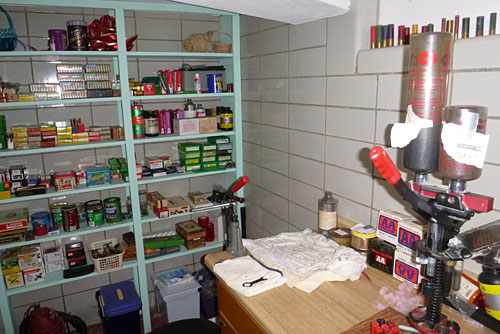 I traversed through dark, dank cinderblocks in a windy cellar. No, I was not being escorted to my very own cell at the local prison. It wasn’t even a guided tour. The described was the labyrinth in my father-in-law’s basement. After a set of creaky stairs and four tight turns, we arrived to Jim’s den. These are the remote confines a spouse compromises and permits such a shop to be set up. The spouse was Mrs. Harper. Such a shop was Jim’s reloading den.
I traversed through dark, dank cinderblocks in a windy cellar. No, I was not being escorted to my very own cell at the local prison. It wasn’t even a guided tour. The described was the labyrinth in my father-in-law’s basement. After a set of creaky stairs and four tight turns, we arrived to Jim’s den. These are the remote confines a spouse compromises and permits such a shop to be set up. The spouse was Mrs. Harper. Such a shop was Jim’s reloading den.
There are two types of people in this world. In fact, the entirety of our population can be lumped into one of the two categories – reloaders and freeloaders. First, you have reloaders. These are the productive members of society who busily toil away at in the name of assembly and create a tangible product. Then you’ve got the freeloaders. These parasitic mooches bum off the talents and work ethic of the reloaders. Jim is a reloader. And I, husband of his lovely daughter Laura, am a freeloader.
Prior to marrying Jim’s daughter, the only time he let me enter his reloading den (or house for that matter) was when he was trying to intimidate me.
“Going on a date with Laura tonight are ya’?” At that, my girlfriend’s father ran his hands through a bucket of bullets.
The smell of gunpowder wafting in the cool air, I squeaked, “Yep.”
“Your name was what again?” Mr. Harper asked as I passed along an impressive cache of various calibers and gauges. Had the military run out of munitions, they need only troop to the Harper household.
I gulped, “M-m-marshall sir.”
Jim took a seat at his reloading bench. I stood. He never offered me a chair. His table caged a menagerie of wild machines. All appeared capable of various forms of torture.
“G-good thing it’s not R-remington,” I stuttered.
“That what’s not Remington?” Jim snapped back.
“My name sir,” I answered.
“Why’s that?” inquired Mr. Harper.
Finishing the joke like a comedian about to file for unemployment, I said, “Because if it was Remington, one of your bullets would have my name on it.” My witty delivery arrived more of a whine. Rather than the intended strong punch line, my words were more like a flick or puff of air.
Unimpressed, Jim replied, “We can fix that.”
Now, at least one of us laughs as we recollect this fond first memory between father-in-law and son-in-law. Had I known Jim was such lousy shot, I’d have never broken a sweat. Upon seeing Jim try to hit a deer, I would have been safe keeping Laura out at least an hour or two past Jim’s threatened curfew.
After quiet reflection and deep pondering, I have arrived at the reason my father-in-law is a reloader. You see, Jim misses his quarry so frequently, he simply must reload to be able to supply his own demand.
Jim’s assembly line goes something like this. Figure out what firearm he will be hoping to shoot in the near future. Set up press for the caliber or gauge. Using the press, Jim then acts as the pastor presiding over the marriage between cartridge, primer, powder, and bullet. Such a balance is a delicate one. Weights and grains are experimented with like a mad scientist who likes to play with gunpowder and shoot guns in his free time.
Jim even owns a tumbler to polish the brass cartridges. I assume he does this process while the brass is still empty, not stuffed with explosives. I have snuck various loose ends in his tumbler of corncob crumbs to surprise him. Be it socks or car keys, my father-in-law can’t find the humor in this.
Through the years, Jim has boasted the many advantages of reloading. Such gains extend far beyond the obvious perks of the pocketbook. The first benefit to reloading is the abusive powers inherit to the hobby. You automatically become the boss of your hunting posse or president of the shooting club. You, tyrant of reloading, possess complete control over the freeloaders in your life. I am certain my father-in-law has gifted me reloaded shells sans shot. I went through a whole box of such little BB-free laughter last January on the final weekend of grouse season. And the autumn I married Laura, Jim tossed me a couple 12 gauge practical jokes in a pinch during a small game hunt. Although Mr. Harper won’t admit to it, nothing else explains how I missed the pheasant flushing at my feet or the rabbit standing within arm’s reach. I almost knocked the bunny out with my barrel as I swung the gun.
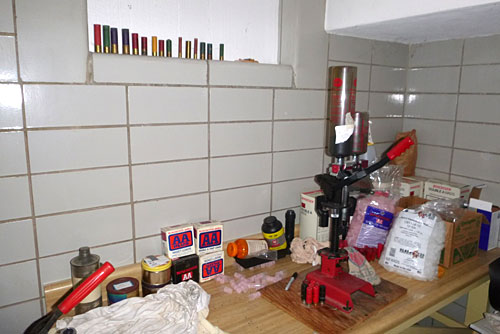 A second delightful joy of reloading is the excuse it gives you. Anytime you make a mistake or forget something during everyday life, whether in front of your buddies or with your wife, blame lead. A reloader’s constant contact with lead, along with serious health risks, should have at least one long term, positive side effect. Take an extra nap. Wear your pajamas in public. Try washing your truck with a banana. It’s the lead’s fault.
A second delightful joy of reloading is the excuse it gives you. Anytime you make a mistake or forget something during everyday life, whether in front of your buddies or with your wife, blame lead. A reloader’s constant contact with lead, along with serious health risks, should have at least one long term, positive side effect. Take an extra nap. Wear your pajamas in public. Try washing your truck with a banana. It’s the lead’s fault.
Finally, a third delight from reloading is an invitation to hunting trips. Others, knowing you will supply the ammo, will undoubtedly ask you to tag along on exotic hunts. And by tag along I mean the tag we commonly refer to as a big game license. Do not be too surprised when freeloaders you load up for free begin whispering detailed directions to their secret spots. You may even begin receiving gifts of bribery to continue filling your friends freeloading hands.
I left Jim’s reloading den not only with a box of #6’s for pheasant come fall and a much needed supply of cartridges for my .270, but also a deeper appreciation for where things come from and the work put into it. Barely able to find the end of this basement maze, I had a hard time climbing the steps with the additional weight of the reloads. Hugging fifty bucks worth of bullets tightly, I looked back over my shoulder and waved to my father-in-law. Old Jim stood there sweating, eager to get back to the press and serve more time in his cellar cell.
Swamped: Chronicles Bowhunting Bogs of Pennsylvania
August –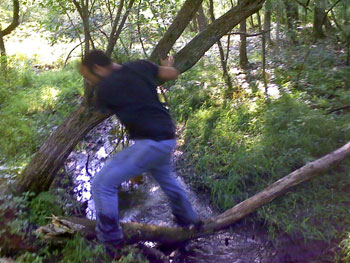 Here we are in the depths of a western Pennsylvania swamp just outside Grove City. Presently, I cannot think of a worse way to spend a humid, 90˚ August day than summer scouting a marsh. The only way to describe such a hell was if you’re familiar with a sunny afternoon jaunt along the Congo, accustom to morning strolls through Vietnam, or regularly meet Satan for coffee and a bagel.
Here we are in the depths of a western Pennsylvania swamp just outside Grove City. Presently, I cannot think of a worse way to spend a humid, 90˚ August day than summer scouting a marsh. The only way to describe such a hell was if you’re familiar with a sunny afternoon jaunt along the Congo, accustom to morning strolls through Vietnam, or regularly meet Satan for coffee and a bagel.
The very bog trying to slowly eat me for lunch, much like a Venus flytrap, is a highly diverse, unique environment. It has to be one of the only ecosystems on earth where the mosquitoes eat the bats. Somewhere within these 28 acres, I fully expect to become the first documented alligator fatality in Pennsylvania.
So why take the grave risk to hunt this swamp? My cousins Grizz and Lou, who are my bowhunting brethren, heard rumors no man had ever stepped foot on this property. Seeing how there was scarcely dry land to set one’s foot, I believed them. Other gossip about deer grandeur was even more alluring. From green deer looking like antlered Chia pets to swamp bucks with foot-long, curved hooves never getting filed down by solid ground.
Conveniently and suspiciously, Grizz was absent for our initial swamp scout. Lou and I didn’t need him. Selecting stand locations was not overly difficult. The process pretty much entailed locating the one or two spots you could actually see further than 7 feet. However, trekking from one area to the next could take hours. At the crawling speed of a hoard of leeches, Lou and I lugged treestand equipment. Hopefully, the leeches would be a polite lot and at least ask the gang of ticks if it was alright to share my thigh.
Another obstacle we bowhunters fought was stand height. Most of our ladder stands perch the archer approximately 3 fathoms above ground level. After we secured the seat and climbed the ladder, rungs disappeared into the mucky underworld. I’d bet we weren’t higher than a few feet from the ground. If the deer were as big as we’d imagined, they would have to look down to detect our presence.
Lou, a zealous biology major, was fascinated with the abundance of life in the bog. From fanged insects to alien-like vines, he cuddled, coddled, and caressed as many species as possible while mounting his trail camera. Lou shouldn’t have touched some of those plants. He’ll be lucky if the rash subsides before October’s archery opener.
September –
3 goals for today:
1. Show Grizz stand locations.
2. Recover Lou’s trail camera.
3. Come out of swamp alive.
I’d settle for one out of the three.
Sharing stand locations with Grizz proved a feeling more eerie than the great lake only a hundred miles to our north. It felt as if we were directing Grizz to our future gravesites. The landowner, Tracy, informed us a few guys had talked about hunting here in the past, but to her knowledge they never got anything. In fact, she couldn’t remember ever seeing them again.
Death wouldn’t come by fall. For if one of us were to slip from our stand’s ledge, I’m certain we’d just sink into the sphagnum moss and assorted semi-liquid vegetation unharmed. No…our demise would come via festering, disease-ridden bacteria patiently lying in wait somewhere in this forsaken bog.
Louie, set on retrieving his Cuddeback trail camera, gave his best leap of faith over a misleading, meandering stream. His landing on the opposite bank, if you wish to even call it a bank (or a landing for that matter), left him waist deep in a black cement muck. After watching Lou struggle for a few minutes, I had come to terms with my decision of leaving our dear cousin behind. Just before I could share my regretful plan of retreat, Grizz, like an overgrown, bearded Lemming, flung himself after Lou. This rare act of courage solidified Grizz’s place in the same predicament only several feet apart from Lou.
In the name of survival, I was now fully prepared to leave both cousins. This deep in a swamp, they wouldn’t have to suffer too long. This thought brought me comfort.
Grizz and Lou refused to go down without a fight. Somehow, playing a muddy game of tug-of-war with each other’s limbs, neck and head, the duo managed to emerge. Save one of Grizz’s boots, all victims escaped from the core of the earth. I watched. Grizz and Lou continued their journey towards the camera. Being helpful, I connected the mud-filled chasm with a makeshift bridge. Admittedly, the only bridge-like remedy I could find within a convenient arm’s length was in the form of an aged branch. The selected stick was long enough to cover the length of the cross and thick enough to give Grizz and Lou a first impression of support. It also provided a false sense of security.
Grizz and Lou, with trail camera in hand, showed up moments later. As Grizz shimmied across the decayed log, after the point of no return, but just before the point of audible celebration, the wood revealed its punk nature. Grizz made a return visit to the mud.
Finally, enduring more pitfalls and skin-slicing ferns, we made it back to my truck in Tracy’s backyard. Kissing dry land, we hopped in my Chevy to check the memory card for images. Ironically, I will forever attempt to delete the next few events from memory. We had over ninety snapshots, an amount worthy of delusion. Grizz and Lou looked over my shoulders intently, fixated on the camera screen. I should have noted the two thugs wore only their underpants. Following their fall, I wasn’t about to let them mud up my interior.
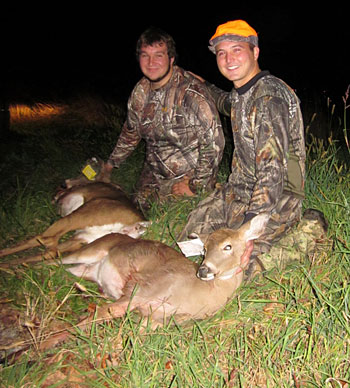 Staring into the camera’s LCD, every honest part of my being fully expected to discover a new species. Those same few honest parts had a lot of explaining to do as Tracy, who was both proud owner of the swamp and my professional colleague, approached the truck to see if something was wrong. Wrong doesn’t even begin to describe what she thought she witnessed. Tracy, upon seeing a co-worker sitting among two mostly nude men armed with a wide lens camera and even wider grin, was left with a lasting impression.
Staring into the camera’s LCD, every honest part of my being fully expected to discover a new species. Those same few honest parts had a lot of explaining to do as Tracy, who was both proud owner of the swamp and my professional colleague, approached the truck to see if something was wrong. Wrong doesn’t even begin to describe what she thought she witnessed. Tracy, upon seeing a co-worker sitting among two mostly nude men armed with a wide lens camera and even wider grin, was left with a lasting impression.
October –
Today we arrive with intent to actually bowhunt.
During the arduous trek t o our stands, local tavern rumors began to fill our heads quicker than happy hour filled their gossiping mouths. One such jovial barstool irregular warned, “Ya’ know dare’s ‘dem Swamp Rattlers in dare dontcha’?”
The gentleman belly up to the bar was referring to the endangered Massassauga. The Massasauga is a rare rattlesnake indigenous to western Pennsylvania wetlands. I wish more rattlesnakes were as rare. And even fewer yet indigenous to western Pennsylvania. Each time the leaves rustled or a fern swayed, I about lost it. I may have hurdled over a tree or two hunting partners during such panics. These once welcomed noises began to sound like rear end-shaking, venomous reptiles. While contemplating the thickness of my boots, I at least wished to encounter one with a generously disproportioned buttocks…reaction time would be longer due to a larger rattle.
Chipping away the mud caked into my ear and wringing out the sweat from my camouflage upon the treetop, I began to think our crew was going to be swamped (pun intended).
Suddenly…splish…splash…splish…splash…
I spied a deer, which by the time it cleared this miserable swamp looked more like a chocolate-dipped doe. To date, I have now discovered three types of swamp deer. One: the aforementioned fudge-dipped variety. Two: younger members of the deer race that penetrate the muck substantially less than we overweight hunters, darkened only to their knees. Third: smart, cat-like deer that painstakingly hop along scattered chunks of semi-solid land. While pouncing, all 4 hooves join together as one while their backs arch into the air like antlered felines.
Although I personally witnessed all subspecies on our hunts, fellow man is much more difficult to identify in the swamp. The only time I could positively discern Grizz from Lou from a hairy mud troll was when the subject spoke, their voice exposing their identity.
A herd of swamp deer strayed beneath each Grizz, Lou, and I. All three hunters were fortunate enough to slice the thick, stale air with arrow. Lou connected on a mature, fudge-dipped doe. Grizz and his bow became victims of the swamp. Taking aim at a small, dark-kneed fawn, the same bow he dry fired in the archery shop and was forced to purchase now struck a metal rest on his stand. As limb slapped steel, strings abruptly separated from cable, while the bow flung from Grizz’s grip. Grizz helplessly looked on as it splashed into the drink. I was surrounded by swamp-skipping felines; an entire pride meticulously and cautiously forded the bog. Being allergic to cats, I felt a sneeze brewing. I closed my eyes and settled my sights on the closest doe.
Nightfall is so aptly named, particularly in a swamp. As darkness descended, so too did we from our stands. As the title nightfall suggests, we stumbled through muck as dark as the sky. The three of us gathered at the truck (this time fully clothed). Lou and I both hit does. Recovering them in a swamp would prove to be as fun as looking for a piece of hay in a stack of needles.
First, no one had remembered flashlights. We were forced to rely on the soft glow generated by moon and opened cell phone.
Second, following a bog blood trail is reminiscent to being led by one-way signage down a dead end road. Worse still, whenever blood was discovered, none of us were sure whether it once belonged to the deer or ourselves.
Third, marching in a short, straight line to stand was next to impossible. Combing through the entire swamp in large, systematic circles wasn’t even fathomable. Try as I might, I’ll never repress the terrifying sound of Lou, a former first team all-state football player (specifically a 315 pound lineman), being gobbled up to his waist by quicksand. The high-pitched squeaks and squeals emitted, a brand more lawn gnome than lineman, haunt me to this day.
Spending the entire night aimlessly and painfully wading through swamp, we miraculously recovered both antlerless whitetails. Well…what were once shades of white. In all honesty, Lou and I weren’t certain if it was our bowhunt or the bog to finish the deer.
November –
Our mid-November trip, autumn’s beautiful gold and yellow leaves having been chewed up by the swamp, made clear many things. First, the naked branches gave perspective to how vulnerable we truly were. Now, rather than being swallowed by surprise, Grizz, Lou, and I were offered a view at our muddy murderer. We were face to face with the goo we had spent all season scouting, accidentally ingesting, and bowhunting. I missed ignorance’s bliss.
Another epiphany, the swamp’s exposed trees afforded a better view of Tracy’s swamp neighbors, which I soon learned were much more colorful than any of the fall foliage.
On the eastern fringes, a questionable family was rearing a kennel of flesh-eating hounds. Purebred and purchased from a pound, these canines were being trained for two apparent purposes. One was dog fighting. The second was barking voluminously while awaiting their next dog fight. From the security of the treetops, Grizz, Lou and I witnessed the entire ritual. I curled up in my stand as a man emerged from his swamp home. Like a sick Santa, the trainer yelled commands and ironic names (such as Buttercup) as he corralled his beasts.
To the westward setting sun, an ungentlemanly farmer had a coop of roosters. So aggressively loud were these cocks, spectators were left to assume their sole purpose was to fight the neighbor’s dogs. I’d of bet on the roosters.
This November hunt, due to all of the other distractions, did not involve a deer harvest. Much better, we three regained our tree stands and lived to tell about it. Generations will hear our story, “So there we were in the depths of a western Pennsylvania swamp just outside Grove City…ya’ know dare’s ‘dem Swamp Rattlers in dare dontcha’?”
Childish Views
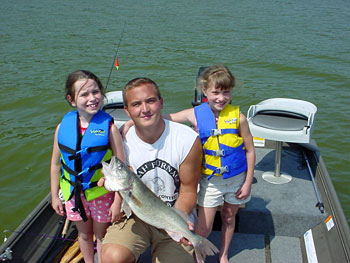 Most squirts have perfect 20/20 vision. It’s not until nearsightedness, farsightedness, and awkwardness sets in during the feared junior high years. It comes to no surprise that, by the time a boy becomes a man, he has lost sight of what’s really important.
Most squirts have perfect 20/20 vision. It’s not until nearsightedness, farsightedness, and awkwardness sets in during the feared junior high years. It comes to no surprise that, by the time a boy becomes a man, he has lost sight of what’s really important.
Growing up on a western Pennsylvania farm, the three Nych brothers looked forward to the three summer months more than any other time of the year. Though school was out, learning took a less formal, wilder form. We spent every waking second fishing farm ponds, jumping in the swimming hole, or camping out with our buddies. There is no better time to be a child than in summer.
“One could do worse than be a swinger of birches,” wrote the great American poet Robert Frost. Frost, who perfectly encapsulated such childish views with his pen, failed to mention what happened next. He left out the part about an old crotchety man, having seen the boy riding a tree he paid for, furiously erupting from his living room recliner.
“Get off my lawn you punk kid!” Depending on the degree of grumpiness, the old man either called the police or unlocked his gun room, cutting out the need for a middle man.
I tend to side with Robert. Only children see the good in everything, sense the potential for adventure, and are endlessly content with the most simplistic of amusements. Sadly, we lose this somewhere along the journey to adulthood. With the exception of electronic crack (video games) and a strange attraction to Japanese cartoons, kids have it pretty right.
Child sees an undisturbed, vast land perfect for exploring and, perhaps even one day settling. This section of uninhabited, unmapped forest may possibly hold dangerous, boy-eating species. But the berry bushes in the southeast corner and swimming hole on the other side of the woods make it well worth the inherit risk.
Man sees a backyard begging to be mowed once per week. As far as the woodlot, the adults haven’t explored it once since moving in ages ago. For the betterment of the child’s pre-dinner dessert, neither parent knows about the berries.
Man sees a pesky sparrow. Not only loathsome to the eyes and ears, this winged worry does a number on just-washed vehicles parked in the driveway.
Child sees the farm’s conveniently abundant species of wild game bird. These daily dozens of shots hone the Ernest Hemingway the boy aspires to become. Each sparrow taken is as moving and valuable to the boyhood experience as a Twain novel. Plus, if he can hit a little bird this morning after breakfast, he won’t miss the lion that may prowl the property before supper.
Child sees a fortress. Hours of entertainment ensue while unknowingly learning every limb. Forever etched in the brain are the curves of the oak leaf and points of the maple. Although the child likely fell once or twice and sustained some degree of injury, there are no grudges – ever. Forgive and forget is the boyhood mantra.
Man sees a tree. The less wild the limbs try to explore this way and that, the better. If left to their own devices, man thinks most trees need a cure for their wildness. Man’s remedy – trimmers. Trees nestled near wires or houses demand the next step of intervention, complete amputation.
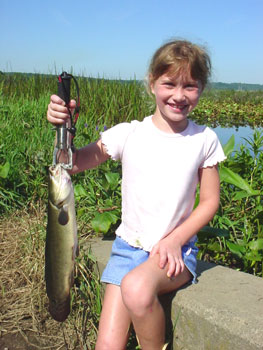 Man sees a bluegill. A bait-sized bait snatcher! A scaled thief! Furthermore, he considers their very presence a nuisance.
Man sees a bluegill. A bait-sized bait snatcher! A scaled thief! Furthermore, he considers their very presence a nuisance.
Child sees a friend. A boy understands and appreciates this species and how many countless fishing trips they have saved. A boy or girl is confirmed to be parting with childhood the very summer a bluegill hooked is not as thrilling as anything they had ever done to that point.
Child sees one of nature’s great beauties. On a good day, even a kid knows the show only lasts a few moments. As if he were watching fireworks on the 4th of July in the town park, the boy stops whatever it is he’s doing and simply and wholly admires the western sky. The only problem with this particular time of day is how mothers tend to head for front doors and hang out of open windows to call their children in from another successful day of play.
Man sees (and likely forgets) a sunset. Barely taking notice, the sinking sun signifies another day under his belt. Following a cyclic prescription to life, he prepares for rest to repetitively recharge for another day of work.
Man sees work. Sadly, a 9 to 5 is no longer the norm. Many fathers and mothers are putting in significantly more than a forty hour work week. Often, jobs spill late into evenings and all over the weekend, leaving children without mentors or guides. This freedom can be good for the occasional adventure. But how would Lewis and Clark have fared without a Sacajawea?
Child sees work as a future opportunity so limitless, they aspire to be wonderfully foolish things – such as astronauts, musicians, actresses, centerfielders for the Pittsburgh Pirates, woodsmen, or the President of the United States.
Child sees a curious creature worthy of capture and scientific study. These six-legged wonders fuel the mind and sharpen the eyes. Kids, discovering hundreds of such gifts, realize just how diverse God made this world. From chasing grasshoppers through Grandpa’s hay fields to catching fireflies in the outfield after the Little League game, bugs are cool.
Man sees a bug. Often welcomed with a newspaper or his size 10½ leather loafers, insects are not associated with happiness.
Man sees a yard littered with leaves that will consume an entire afternoon. Much sweating, raking, and toiling are in tow. Worse yet, this annual annoyance peaks during football season where four quarters equates to three hours on the couch. Here, the parent is disconnected to every aspect of life save cable television.
Child sees a seasonal treasure more satisfying and memorable than birthday cake. Not only is each leaf beautifully colored, the child also takes in the fresh, earthy scents associated with autumn. Best of all, these single beauties marry to become a leaf pile. Boys and girls jumping, swimming, and hiding in piles of leaves are perfect snapshots of the rural American childhood.
Child sees white flakes descending directly from heaven. The ones not used for a fort, snowball, or for sled riding are encouraged to float down onto the tip of the tongue. They have more flavor than water. Likely, children would agree more taste than ice cream. Although children cannot quite describe the natural flavor, it possesses a hint of life.
Man sees a burden. Not only will snowfall inevitably cause the heating bill to skyrocket, but now he has to bundle up and attend to the chore awaiting him on the driveway. To boot, he is armed only with a shovel. Although his kid, donned in a one-piece snowsuit that gives the appearance of width being equal to height is eager to assist, the man fails to see the pleasurable makings of a memory.
Child sees a fishing rod as a part of his being, a third arm…at least when school’s out. A magician has a wand, an artist has a brush, and a child has a fishing rod. This is simply the way it is.
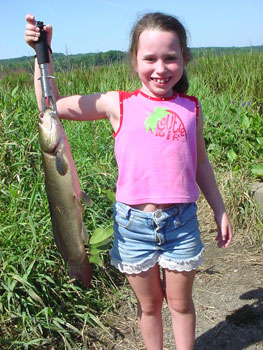 Man sees a fishing rod as the distant past. At 7 feet long, it is a fine dust collector leaned in the corner of the garage. A rod’s convenient shape, when placed vertically, stays out of trouble better than his kids. The only reason he hasn’t gotten rid of it is due to it not interfering when he is fetching the rake or shuffling towards the lawn tractor. The rod hasn’t been horizontal, patiently waiting for a taker in more than a decade.
Man sees a fishing rod as the distant past. At 7 feet long, it is a fine dust collector leaned in the corner of the garage. A rod’s convenient shape, when placed vertically, stays out of trouble better than his kids. The only reason he hasn’t gotten rid of it is due to it not interfering when he is fetching the rake or shuffling towards the lawn tractor. The rod hasn’t been horizontal, patiently waiting for a taker in more than a decade.
A man complains of summer drought, but hadn’t he read about it in the local newspaper, he may not even know it was occurring. Creeks are low and his lawn is brown. Sadly, he has only felt the pulse of the latter.
A lack of rain only makes a child’s curiosity grow. How can such deep tradition come from waters so shallow? How can such fulfilling memories coincide with a tackle box so empty (even after he has borrowed a few of Grandpa’s lures)? How does such a colorful creature call home to waters so clear? Temporarily at least, the fish and the boy both forget the drought.
A man would see this story as a delicate, melancholy balance between a fond childhood lived and a busy life passing too quickly. Best case, the man puts down this story and does something worthwhile, such as a familiar hike to an old farm pond to skip a few stones.
A child would never have made it to this point. Kids are far too consumed by creating actual childhood adventure to read a story about it.
My reply to you Mr. Frost, “One could do worse than have the eyes of a child.”
A Snag on the Family Tree
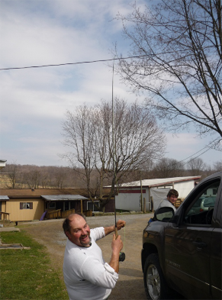 Fishing is a funny business. Think about it. When I go to a baseball game, I would be mighty disappointed if I didn’t see a baseball. When I go to a concert, I would get a full refund if there were no music. However, while fishing, I rarely see a fish…let alone catch one. Still, year after year, I merrily purchase a license to fish with family and friends, teaching them the messy art of fishing.
Fishing is a funny business. Think about it. When I go to a baseball game, I would be mighty disappointed if I didn’t see a baseball. When I go to a concert, I would get a full refund if there were no music. However, while fishing, I rarely see a fish…let alone catch one. Still, year after year, I merrily purchase a license to fish with family and friends, teaching them the messy art of fishing.
Apparently, Uncle Ed enjoyed “teaching” such lessons. If fishing were fine art, you’d likely find Uncle Ed finger painting. On a warm Sunday afternoon in April (the kind that feels particularly fishy), the cousins planned a fly-fishing trip. Although no one actually said it aloud, we all thought we had a better chance of fooling trout after church as opposed to during the Sunday service.
As my cousin Grizz and I pulled into the Franklin family dairy farm, I didn’t want to believe what immediately caught my attention, although what Uncle Ed had caught was much worse.
Uncle Ed had dusted off his old fly rod (which looked strikingly similar to the incentive he uses on uncooperative cows, dogs, and children). The great fly fisherman began peeling line from a screeching fly reel, simultaneously flicking his wrist. After a little bragging and aggressively thrusting his line back and forth, Uncle Ed’s fly gently wrapped a power line and hooked the maple tree overlooking the driveway. Old Ed would be an excellent instructor for catching squirrels, birds, or electricity. However, Uncle Ed was about fifteen feet too high for most trout.
“Let’s get outta’ here!” hollered the two embarrassed Franklin boys – Dean and Billy.
We completely understood their desperate desire to escape. Both Grizz and I were pretty confident that if we stayed a moment longer Uncle Ed would unanimously elect one of us to climb the maple and untangle his fishing lesson.
“Who’s driving?” I asked.
Everyone (minus me) began drifting directly towards my truck. There wasn’t even a proper discussion.
Those dairy farmers sure know how to trash a truck. In fact, they bring a significant portion of their dairy farm with them every trip. It has come to the point where I started making the Franklins take off their shoes, socks, and pants every time they ride with me. This has led to some awkward moments. For example, petrified pedestrians looking down from bridges, drivers pulling alongside at a stop light, and witnesses who catch a glimpse of the farm boys emerging from the truck have all been victims. I try to avoid well-lit areas for our displays of humanity.
As we approached my favorite trout stream, the Neshannock Creek, I instantly wet my line. My spirit was quickly lifted by the naïve confidence typically experienced at the beginning of a fishing trip. This illogical optimism occurs before mistake and disappointment have enough time to take hold.
I was honored to impart some fly-fishing skills, wisdom, and habits to my cousins. I have learned a considerable amount from a decade’s worth of error. For instance, whenever one of the cousins got a strike on his black wooly bugger or egg pattern, I modeled how to artfully encroach his hole. Next, I demonstrated proper fishing knots while tying on a black wooly bugger or egg pattern.
In addition to actual fishing advice, I explained the snobby niceties and language of fly-fishing culture. One does not lower himself by saying bobber. Heavens no! In the fly-fishing world, bobber is a cuss word loathsome to the ears. This may be a complete surprise to the majority whom believed the hook was the most harmful to the ear. The correct title for this float is strike indicator.
In the same respect, one would be foolish to jeopardize class, rank, and reputation to refer to a fly rod as a pole. Poles are north, south, or magnetic. Rods are uncontrollable sticks speeding towards humiliation, heartache, and tree limbs.
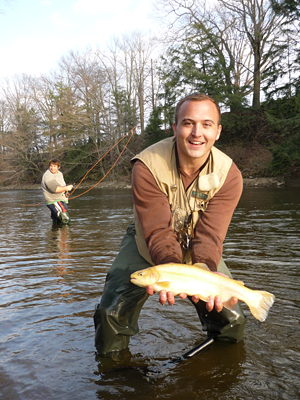 Billy, perhaps being in his rebellious, delinquent years, stated, “Hey Marsh, I think I just had a hit on my pole. The bobber went straight down!”
Billy, perhaps being in his rebellious, delinquent years, stated, “Hey Marsh, I think I just had a hit on my pole. The bobber went straight down!”
“Really?” I asked in disappointment. Seeing my sorry cousin needed closer counseling, I waded towards him and the hungry trout.
“Why are ya’ slowly moving closer to me and my good spot?” the confused Billy asked.
“What are you talking about?” I continued, “Just watch your bobber!”
Just as I reached little Billy, he became nervous. His casting reflected his uneasiness. Billy’s frantic hope to beat me to his fish wound up creating the worst snag I had ever witnessed. Sure I had conjured some incredibly bad tricks with my wand, but this was the most serious mess I ever witnessed. To this day, Billy blames my “in-your-face” teaching style for the reason he wrapped around a sycamore branch about thirty times. He shouldn’t have set the hook.
Dean, being the caring big brother he is, helped little Billy get out of the mess. It was Dean who used all his chore money to pay for the flies. Dean waded across the creek to reclaim the tackle he had let his little brother borrow. Upon their encounter, tackle was a fitting word.
I couldn’t help but think how proud Uncle Ed would be had he been streamside with the rest of us. Billy did exactly as his father had taught him only an hour ago. If you ask Dean, Billy was even higher in the tree.
Grizz and I looked on in sinister anticipation as Dean and Billy began their trek across the stream. They stumbled over stones and ricocheted off rocks. During this epic ford Grizz whispered, “Hey Marshall.”
“Why are we whispering?” I whispered.
“Look at those two!” Grizz chuckled.
“Do I have to?” I whined, clearly still attempting to catch Billy’s fish.
“It looks just like one of those television shows.”
I quickly remembered, “Oh yeah, the reality show following two runaway clowns who had escaped from the circus.”
“No!” Grizz hollered, “The nature flicks where the sow leads her cub into a river to catch trout!”
Grizz and I agreed the bruins on television fared much better. Not only do the bears on the screen actually catch their limit, they are much better looking as they plunge with purpose into the cold spring water. Purpose had nothing to do with the Franklin boys’ dip.
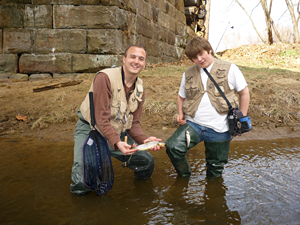 At the conclusion of our fly fishing trip, we had amassed a whopping zero trout, one creek chub, seventeen maples, and one sycamore. This was the pioneer fly fishing trip for the rookies – Grizz, Dean, and Billy. Hence, I was the only expert. It was to be expected I caught all the fish, one more than the other three fishermen combined.
At the conclusion of our fly fishing trip, we had amassed a whopping zero trout, one creek chub, seventeen maples, and one sycamore. This was the pioneer fly fishing trip for the rookies – Grizz, Dean, and Billy. Hence, I was the only expert. It was to be expected I caught all the fish, one more than the other three fishermen combined.
Finally, the three cousins learned the worst part of any fly fishing trip – removing waders, boots, and hooks from our bodies. Big Dean attempted to peel off his waders. Taking any waders off is a task in of, around, and inside out of itself. Couple this obstacle with the fact Dean had borrowed his father’s waders. Fishing with Big Dean is like fishing with Bigfoot, for his size and strength equals two men and his feet would barely squeeze into clown shoes. Uncle Ed trips around on a size 9 ½ and tips the scale at a buck seventy-five soaking wet. Unfortunately, it was Dean who was soaking wet. The only thing less fun than removing waders from oneself is removing wet waders from Big Dean. Dean, meeting every definition of wet, had fallen into the creek just ten minutes earlier.
Inevitably, Dean got stuck as he attempted to escape the wrath of wet waders. The rest of us scratched our heads trying to come up with an idea of how to separate the waders from the cousin. I was fine with leaving Dean there overnight to dry.
At the last minute, Grizz grew tired of scratching his head and tried to remove Dean’s. Grizz swung his arm around Dean, placing him into a headlock. Following Grizz’s violent lead, I pulled Dean’s boots. Billy, seeing I was no match for the suctioning grip that had consumed his brother’s feet, pulled on me.
At the pinnacle of our assault, we fishermen were too exhausted to hear the approaching engine. A car, casually enjoying a Sunday drive, spotted us. By the looks on their faces (or Dean’s), they must have thought we were branding a steer. Suddenly, the small dirt road became a drag strip. The vehicle sped away from what was clearly imminent and immediate danger. We cousins were not as fortunate.
After several more tugs, pulls, twists and screams, I was flying through the air with a wet boot in my hand and a wet little cousin on my back. Big Dean forcefully flung the other way. Too bad for Grizz—he was directly below the other way.
We planted ourselves throughout the field, exhaustedly panting for what seemed the better part of the evening. Slowly gaining our composure and trying to collect the few pieces of our dignity that had been strewn about the field, we headed for the truck. My truck.
“Let’s get outta’ here!” gasped Dean.
“First,” I lectured, “you Franklin boys know the routine.”
After the mandatory disrobing, the family of four started our drive home.
Trying to break the awkward silence commonly associated with four disgruntled, half naked fishermen returning home from an unsuccessful trip, I said, “Well Billy, did ya’ learn anything from this fishing trip?”
Billy quickly replied, “Yeah. The next time I get snagged on the family tree, I’m cuttin’ the line!”
Walking on Water
Human culture has always been fascinated with the idea of walking on water. In short, people want to go where they do not belong. The great inventor/artist Leonardo da Vinci sketched designs for floats allowing man to go for such a stroll. This miracle is even found in the Bible. In Matthew 14:22-33, Peter walks on water. Unfortunately, for him, Peter was soaked when the winds strengthened and his faith weakened.
Whether illusion or miracle, some species of lizard and bird are just ornery and wiry enough to walk on water. The basilisk, dubbed The Jesus Christ Lizard, hikes across the surface at nearly 5 feet per second. Wilson’s Storm-petrel, a seabird, raises its wings and skims the plane looking for food. This aerial action appears to be more of a tiptoe or dance on water’s face than flight.
Peter isn’t the only man who gets to walk on water; ice fishermen across the northern tier of our country sit upon buckets or in shanties to feel this sensational opportunity every winter. Ben Moyer, a great friend and even better writer, invited me to join him on a January trip to his property in southwest Pennsylvania.
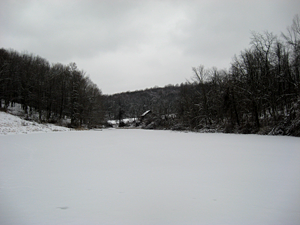 Writers and their classic typos; Ben and I sent each other a series of e-mails in the weeks prior to our late month excursion. Located in one such data-packed reply were suggestions of what to bring and wear. I became completely and utterly baffled when my eyes reached line 4, suggestion 9. “Marshall,” Ben wrote, “you better wear wood pants.”
Writers and their classic typos; Ben and I sent each other a series of e-mails in the weeks prior to our late month excursion. Located in one such data-packed reply were suggestions of what to bring and wear. I became completely and utterly baffled when my eyes reached line 4, suggestion 9. “Marshall,” Ben wrote, “you better wear wood pants.”
What?! Wood pants? Never having heard of such a thing, I wasn’t about to question my mentor, a seasoned ice fisherman and experienced writer. I went where any sporting man’s pride would have led him. I checked every store within a fifty-mile radius. Funny, not only had no one ever heard of wood pants, in the process, I received some hardy, splintering looks.
There comes a time in every angler’s life when he realizes he cannot buy happiness. This is when the angler must make it himself. With a little misguidance from Uncle Mike, a high school shop teacher and owner of a fortress of drills, saws, and other manly things, I tailored the blueprints for my wood pants. Knowing Ben, he’d have recommended tulip poplar.
About a week later, Ben spell checked and clarified his email. “My apologies Marshall,” Ben continued, “in an earlier message I advised you to wear ‘wood’ pants. Wow, I hope you understood that was a typo, and I really wanted you to wear ‘wool’ pants. Not wood.”
Naturally, in my correspondence with Moyer, I lied. My relieved fingers typed, “Haha! Of course I caught your typo Men Boyer. Who wood wear would pants?”
I arrived to the southeastern Pennsylvania village of Khedive, minus wood pants, to Ben Moyer’s 110-acre slice of heaven. Khedive, interestingly named, is the very plunge I was forced to take in an ice fishing nightmare the prior night. I dreamt about helplessly watching tackle, trucks, friends, and keys be consumed by the icy depths. Wanting to warm up in the truck or unlock the house, I leapt after them on a “Khedive.”
Pulling up to Ben’s Chevy Colorado, it sure was good catching up with an old friend. Not the Chevy, Ben. After a handshake and excited greetings, I offered Moyer a few gifts. First, I gave him a large smoked trout from a fine meat shop back home. Ben placed it in a seat of honor…the front seat. He may have even fastened the seat belt around the fat fillet. I think he was planning on making me ride in the back. Finally, I presented my most recent collection of stories. Ben threw my book in the bottom of the bait bucket, alongside our maggots and minnows. “Let’s fish!” Ben said. I could tell he was touched.
My curiosity for the new gear and tactics of the wintery world of ice fishing was quenched. Along with the necessities in clothing and tackle, Ben owned miniature rigs called Schooley rods and reels, a set of slick fishing devices called tip ups, an ice auger, and a sled…all for me to carry. Fumbling around with all of the equipment, the gear took turns falling from the sled like playful children. First, the minnows took a daring leap of faith, sliming the fishing vests. Next, the bucket o’ rods plowed into the deep snow. Everyone wanted a turn, so the fun continued with other articles of clothing and equipment until we got to the pond.
As we set up camp, Moyer displayed the utmost safety. We donned personal floatation devices, so when the rescue team found us, we’d be floating around the pond like a couple of ice cubes in a wide glass of milk. This would save them from having to put on wetsuits. Ben even had a pair of ice pick lanyards, used to climb and maneuver if one slipped into the drink. It felt chillingly dangerous, yet stylish to wear sharp ice picks around my jugular all day. Finally, my friend and mentor secured a fifty feet section of rope to a sturdy tree at the pond’s bank. Our holes ranged from fifty-five to sixty feet from shore. In the case of an emergency, I prayed our flailing arms would compensate the ten to fifteen feet shortage.
Two unused rescue ropes mere feet from broken ice wreckage reminded me of a Gary Larson The Far Side strip.
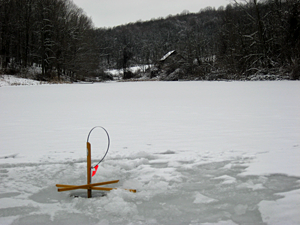 Speaking of holes, half the fun was getting to use Ben’s new ice auger. After modeling how to properly drill one, Ben was kind enough to let me make the rest. Like I said, Moyer is a good friend. As the blade chewed through the slush and ice, I reminisced about the many times I was a husky little boy armed with a snow cone. It was warm back then.
Speaking of holes, half the fun was getting to use Ben’s new ice auger. After modeling how to properly drill one, Ben was kind enough to let me make the rest. Like I said, Moyer is a good friend. As the blade chewed through the slush and ice, I reminisced about the many times I was a husky little boy armed with a snow cone. It was warm back then.
After churning about a dozen openings, each 7 inches in circumference, I noticed the water level would fluctuate. For a moment, the water line was flat, steady, and even with the ice. Then, suddenly, the water would dip below its original level. I was quite interested watching the ironic pulsation of the water’s breath. Although a layman may explain this movement was due to wake, tide, or current, experts know this phenomenon is the heartbeat of the lake. Of the two of us, the pond and me, at least one of us had a pulse.
Now that the holes had been dug, it was time to actually fish. Ben and I set about 5 or 6 Schooley rods, which are small, simple devices designed for small, simple fishermen to catch small, simple fish. About a foot in length, Schooley rods are adorned with a bright, fluorescent orange tip to indicate a strike. Moyer also placed 3 tip ups with fat minnows, for any larger game fish, say crappie, bass, or marlin.
Not since I was a young lad had panfish got me this worked up. As we two philosophers sat upon buckets, as if every worry and problem in the world could fit inside 5 gallons, Ben and I caught up, talking about family, work, and the outdoors. When the orange tip would jiggle, I’d slip and slide my way towards the rod. Since I was an ice-fishing rookie, none of my angling skills had yet solidified. I missed the first two bites, but made good on the third. All at once, I set the hook and slipped to my knees, nearly cracking the ice…or my kneecaps.
For the next five hours, this mad excitement commenced. Moyer and I had pulled over fifty bluegills from the pond. Contrary to the weather report, we had found a hotspot. Surprisingly, the trip was as smooth as the pond’s frozen surface.
Enjoying one of the many doubles of the day, a third Schooley rod began to shiver. Ben and I assumed the few-ounce fish we had averaged would patiently take a number and wait for the first available fishermen to become freehanded. So you can imagine the shock across Ben’s face as his rod quickly plummeted into the icy waters. For the first time that day, silence consumed our delightful conversation. I allowed for time and cold, brisk air to ease his pain. Faced in opposite directions, I began to hear awful moaning and groaning sounds. Thinking it must be the ice separating, I was ready to kiss this life goodbye.
“Ben!” I yelled, “Is that the ice making those awful sounds?”
Clearing his throat and regaining his composure, Ben confided, “Sorry…almost lunchtime.”
Just then, the furthest rod from us began skiing along the slick surface. Ben wouldn’t be able to handle a second loss. With everything I had, which was probably not much, I used my Rocky ice skates to reach the runaway rod. Still six feet away, the rod fell into the hole. I dove, shoving my entire arm into the cavity, fishing around for the rod. Miraculously, I swiped it, and somehow gripped its cold handle. Upon lifting the rod, I realized it had become frozen to my hand. I felt as brave and daring as those polar bear plungers (the ones who go into their arm anyway). I have always adhered to the guideline that someone getting wet is a pre-wet-quisite to any memorable fishing trip.
After saving the rod with the ice-defying move that will be studied in local history as “The Plunge”, Ben and I decided it was now time to fillet the fish. I learned Ben is a master with the blade. I watched on in amazement as he sliced through the frozen flesh like a sunfish samurai. I offered to help, as if my spectator powers or very presence was a form of assistance. Ben said, “No.” It is rude to argue with a host, so I kept fishing.
As Moyer prepared a lakeside lunch, or more appropriately, a frozen dinner, I broke a few items of gear and broke down the rest. Equally as impressive as his knife work, Moyer created a 5 snowflake meal (flakes replace the star system in January) from eggs, cornmeal, paprika, bluegill fillets, a Ziploc bag, and a Coleman stove. As we thawed upon our table for two, also known as Ben’s tailgate, I knew this would be a fishing experience never to forget. Every time I looked in the mirror and saw my blue nose and ears, or where they used to be, I’d remember this cool trip with Ben.
Allow me to retract my earlier thoughts and feelings about ice fishing. It was so cold, I really didn’t have too much feeling, but I realize the error of my way. I had always told family and friends that ice fishing was too pessimistic for me. Legally, the hole could not exceed 10 inches in circumference. Any fish worth catching is significantly larger than this restriction. I just wouldn’t be able to live with myself had I hooked the biggest trophy of my life and could only manage to get his upper lip through the ice.
Worry not, ice anglers. Ben has taught me there are not fish this large come winter. All fish, even the real lunkers, shrink in winter’s cold and easily fit in a 7-inch hole. The fish swell to their original size come spring. To prove this, Ben and I landed over fifty fish, not one was longer than the ice was deep. Must I admit we were standing on a mere 5 inches?
I now understand ice on the lake is better than the icing on the cake. Let us celebrate, for these times are the only ones when mortal men, like Ben and me, get the chance to walk on water.
It’s Just a Game
 To the layman, game management might refer to the woes of being the banker in Monopoly or suffering nomination to pick up the pieces of Life. Others may assume game management alludes to replacing the batteries of Operation or sorting the tiles in Scrabble.
To the layman, game management might refer to the woes of being the banker in Monopoly or suffering nomination to pick up the pieces of Life. Others may assume game management alludes to replacing the batteries of Operation or sorting the tiles in Scrabble.
On the contrary, sportsmen know game management is much more difficult and complex…and less fun. For rather than manipulating plastic pieces, playing cards, and dice, game management involves feathered critters, furry beasts, and scaled specimens.
Theories on game management date all the way back to the Old Testament. Genesis 1:26 gives man power over animals: “And God said; Let us make man in our image, after our likeness: and let them have dominion over the fish of the sea, and over the fowl of the air, and over the cattle, and over all the earth, and over every creeping thing that creepeth upon the earth.” I’ve been waiting patiently for such authority since the ripe age of 8, with my first Daisy BB gun in hand.
My newest revolutionary thought on game management takes care of minimizing populations of undesirable species. To get rid of unwanted pests and invasive species, we need only change their names. The instant you changed their status to desirable game or trophy, they would become rare. A real life example you ask? Zebra Mussels plague the Great Lakes only because they are considered invasive species. You don’t see trophy fish—say walleye—overpopulating and causing fishermen headaches. Hence, officially convert Zebra Mussels to trophies and their numbers plummet. Claim them to be a delicacy, and populations dwindle even more drastically. Likewise, if we begin believing delicious walleye to be little more than mediocre nuisances, they will attach themselves to our stringers and swim into our nets.
Enormous energy has been poured into game management. The majority of this effort is aimed at the whitetail deer. I have several original, controversial thoughts and theories to share. A dilemma occurs when surveyed hunters report they do not see enough deer. There is an immediate contradiction when researchers and biologists ask the deer. Typically, the deer complain they encounter too many hunters.
The buck doesn’t stop there. Human and deer conflict collide with so many facets of life. Good luck balancing drivers, farmers, hunters, foresters, nature lovers, and gardeners. There is about as much harmony among the sides as there is in a struggling, untalented grade school band.
My contribution to deer management is noticing the correlations between the most obvious patterns that many fail to observe. For example, last autumn deer populations seemed down. However, the spots I hunt were littered with squirrels. You name your brand of squirrel, red, fox or gray, it was incessantly chattering around me. My conclusion: squirrels must eat venison and are to blame for deer declines.
While I am on the issue of small game – small game limits would be less confusing if hunters were permitted to take as many critters as could fit in a game vest. This simple, easy to follow guideline would equate to 4 rabbits, 3 grouse, 2 pheasants, or 1 turkey (and, if one so desired, 1 porcupine). These bag limits all seem fair and reasonable. Problems arise when you try this equation with big game. Try to fit a rutting buck in your pocket and see what happens.
Since this is a serious scientific study on game management, I had better put some Latin, Greek, or other ancient language none of you understand. Here it goes – much of our game relies on wetlands. Hela, Greek for bog, is a prime illustration. Next time you find yourself hunting in a swamp and screaming, “I’m having a hela time here!” consider yourself an intellectual, not riffraff. Since countless game and bird species depend on these spongy systems to raise young, keeping people out would bolster populations. This move would benefit both wildlife and human life regarding these hellish domains.
While I am talking about game I might as well comment on fish. Just because you see a fish does not mean it’s actually in the lake. Although deceptive, the number of fish that jump and are seen while you munch away at a sandwich is significantly greater than the number of fish underwater who want lunch. To solve such problems of culinary cooperation, I have initiated development of a fish food for wild populations. The chum is very similar to the flakes one buys from a pet store to sprinkle atop their home aquarium. The problem in nature is that no one is willing to keep the fishbowl clean.
Those up to date on current trends with fish populations know too well its declining state. The salmon is a case in point. While runs used to be as thick and jet black as the mane of a Native American chief, modern migrations are more like Uncle Ted’s balding scalp. With one fell swoop, this course could be altered. By simply naming salmon species Ella, an epidemic of catch & release (or perhaps just release) will become the norm. Few will brave eating a salmon named Ella.
Since I am solving all of these fishy problems, I should address fisherman as well. My idea for further management of this odd species is to illegalize creels. My first argument, fly-fishermen are perceived by the public to be carrying a wicker-man purse likely made by an apathetic dropout of a basket weaving 101 at the local community college. Second, the fishermen can’t keep fish if they have no where to put them. Fish populations will flourish and fisherman won’t be stereotyped by the general public. Those rare holdouts slipping fish down their waders will eventually be thinned out.
Perhaps the greatest threat to game management is the current public versus private land debate. Land is becoming less accessible to hunters and outdoorsmen. People are hesitant to share their privates with the public. As sportsmen, we need to strive to be more public with our privates. Perhaps tax breaks or other monetary incentives would coax shy, backward landowners to share their privates with the masses. A sad trend – the only privates offered to the public are undesirable privates no one in the public wants to explore.
Another element to game management is the means and tools used to take game. Some men prefer traditional equipment only a shade more evolved than the rock. Such groups may use bow, muzzleloader, or atlatl. On the other end of this spectrum are people who prefer heading afield with state of the art military weaponry and optics. Game managers must juggle and satisfy both categories of goofball.
Since I have now offered game management suggestions for invasive species, big game (deer), small game, wetlands, fish, fisherman, public land and hunting implements, I shall conclude with thoughts on our avian friends. The other day I read (yes, I can read) that the blue jay is arguably the number one disperser of oaks in the northeast. In fact, these annoying blue birds cache around 4,000 acorns. Many were the time I wanted to shoot one of these obnoxiously loud, bossy-at-the-feeder birds. Some would argue this unknown oak-friendly fact is evidence in their favor. I would rebut that this new understanding should immediately lead to a jay season. Think about it, a living blue jay may go back and find half of those 4,000 acorns. But a dead bird would leave them all planted. I would enjoy going jay walking in the woods…with a shotgun.

